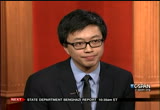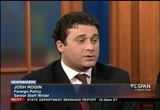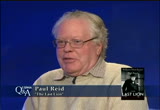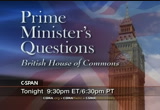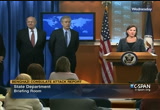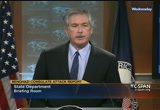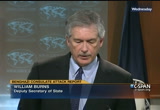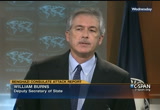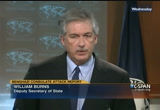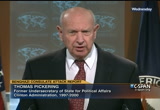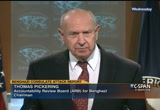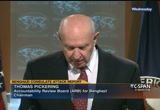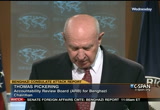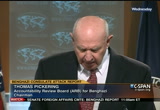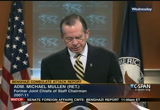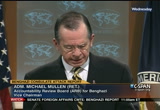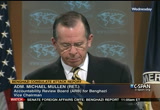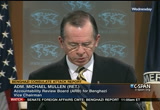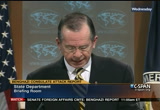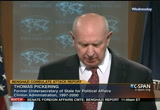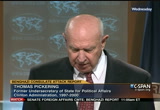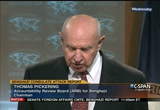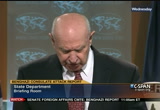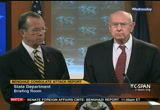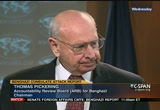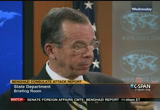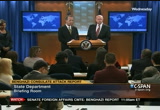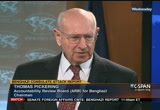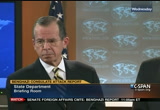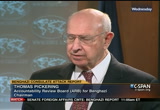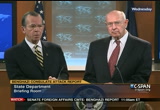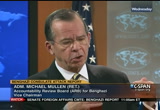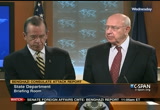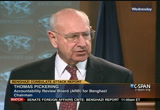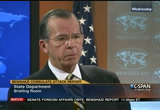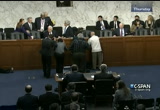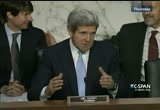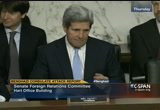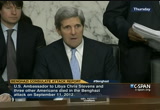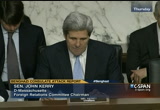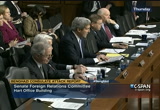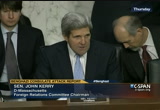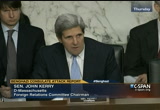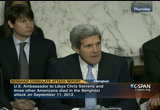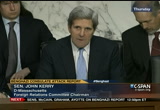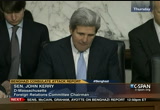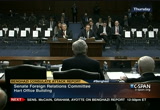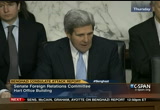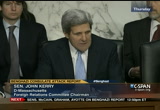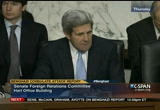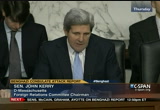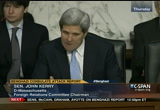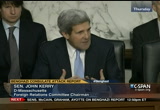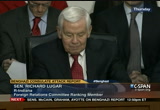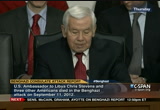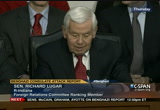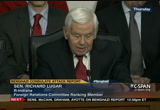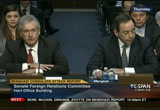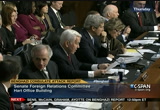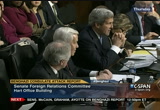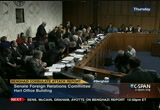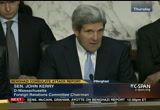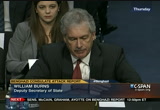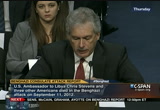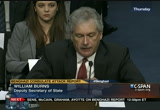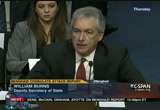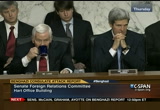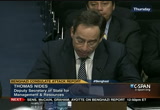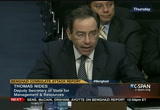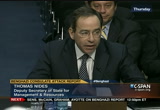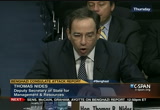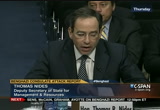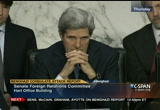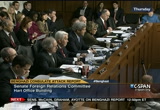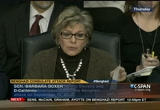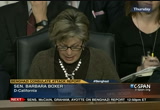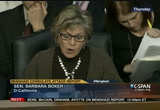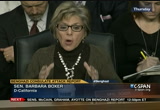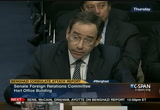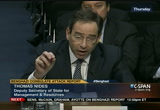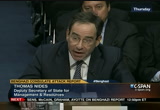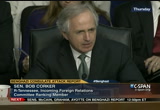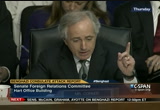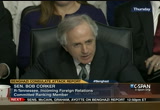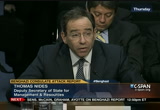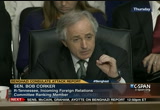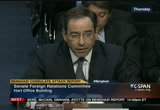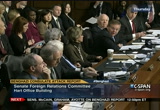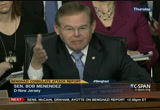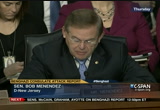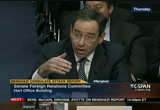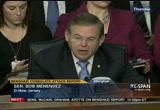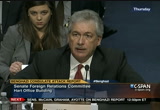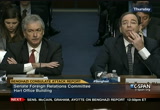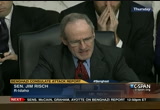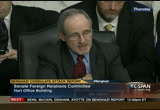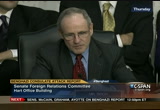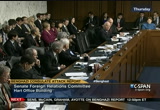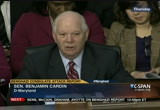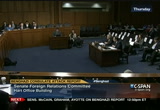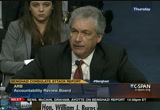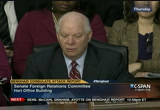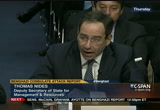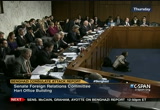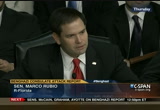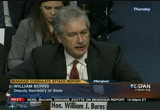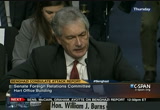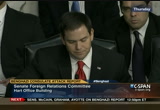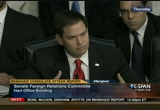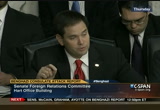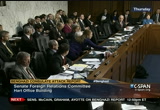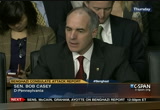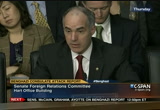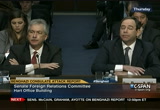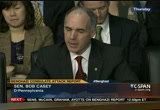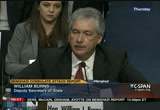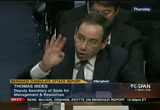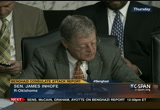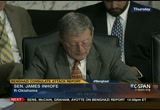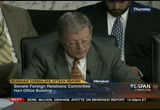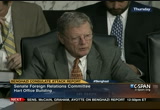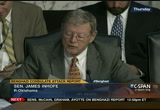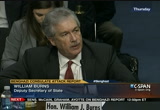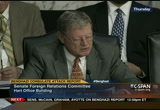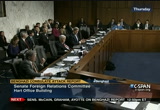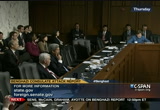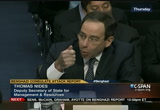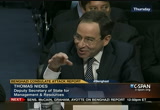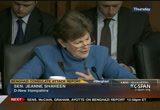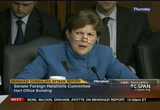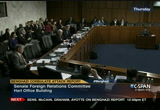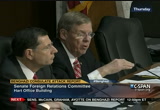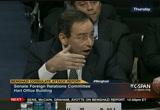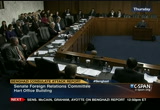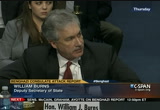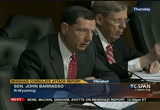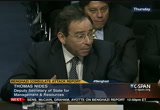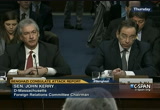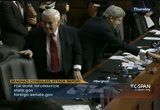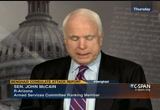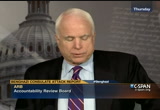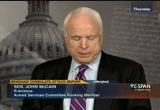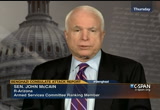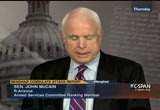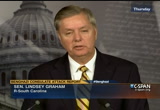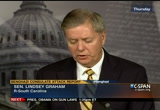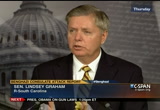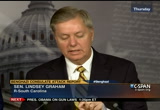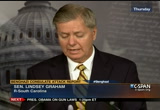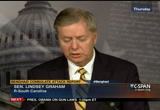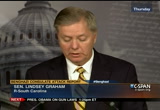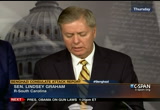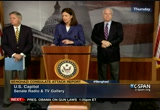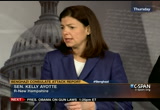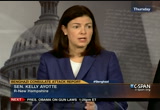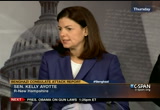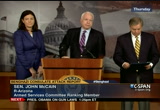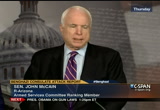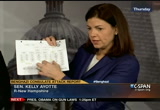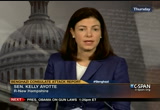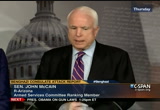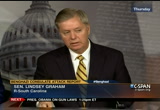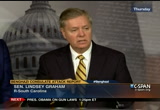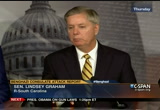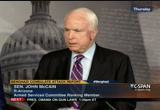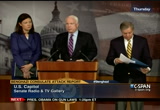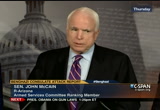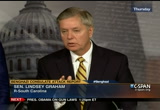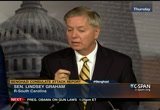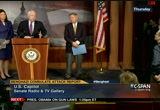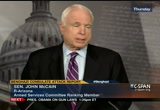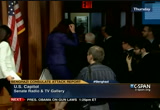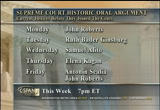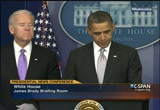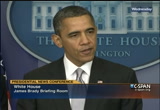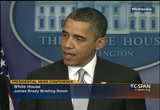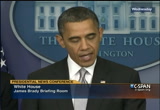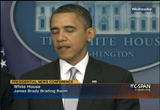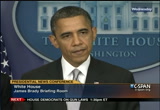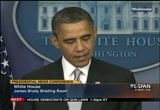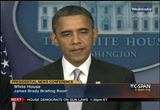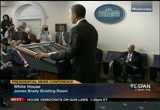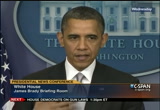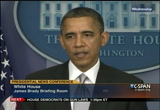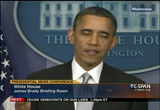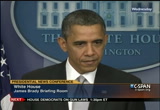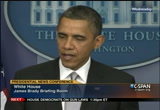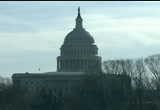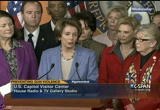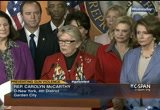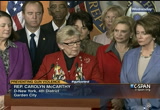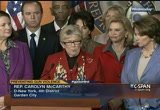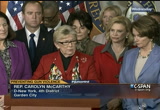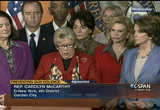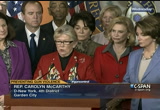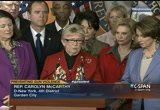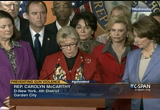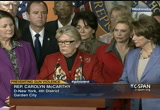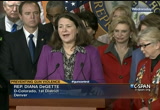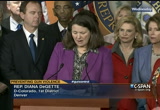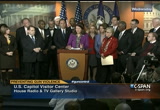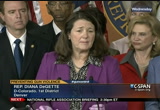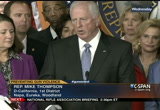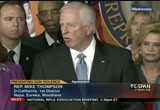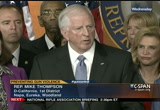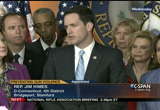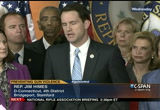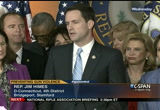tv Washington This Week CSPAN December 23, 2012 10:30am-2:00pm EST
10:30 am
experienced person such as leon panetta continuing role for a little bit longer. >> you both seem very interested the syrian question and arms going to the serbian rebels. what is behind your interest there -- syrian rebels. what is behind your interest on their? >> the administrations's policy, which is a legitimate and fair balancing of american values and interests, is ultimately untenable. there are actors in the region, the regional leaders, people inside syria who are calling for more u.s. involvement and activity. there's an expectation that after the election the obama administration would take the wondering- we're all and waiting to see what is going to be. >> thanks to both of you for your questions. [captioning performed by
10:31 am
national captioning institute] [captions copyright national cable satellite corp. 2012] >> if you work for them, you get a mercurial, sometimes j generous, almost cruel boss. he did not know how to apologize. men of his age and class are not going to apologize to a young secretary our typist. he had a way of turning the tables. his version of apology would be to say, i am a kind man and you're doing a good job today. the issue is never settled. he always had to get the last word in. one night going through white hall, a german bomb fell nearby. his bodyguard pushed him into a
10:32 am
doorway. a couple of thompson's men were slightly wounded. churchill did not like to be touched. he said, thompson, do not do that. tonight, and extended 90 minute q&a with paul reid. "the last lion," tonight at 8:00 on c-span. >> david cameron announced the 3800 bidders trips will be withdrawn from afghanistan by the end of 2013 -- british troops will be withdrawn from afghanistan by the end of 2013. questionsster's tonight at 9:30 p.m. eastern and pacific on c-span.
10:33 am
thomas pickering said the state department left officers on the ground ill-equipped to deal with the september 11 attack and benghazi, libya. the state department security chief and two other officials resigned in the wake of that report, which found systemic failures in libya. ambassador pickering is joined by german mike mullen and dignitaries secretary of state william burns -- chairman mike mulen and secretary of state william barnes. this is about 30 minutes. >> thank you for joining us. the accountability review board on benghazi that the secretary established has not completed its work. the classified and unclassified versions have been released to the hill. u.s. had a chance to see the unclassified version as well as
10:34 am
the secretary's letter to members. today we have invited the chairman of the accountability review board thomas pickering and admiral mike mullen to join us here to address your questions. introducing them will be to and deputy secretary of state bill burns. as you all know, deputy i will make a couple of quick points and give the floor to admiral mullen. as secretary clinton said in her letter to congress, we accept
10:35 am
each and every one of the board's recommendations and have already begun to implement them. in accordance with the law, secretary clinton ordered this review to determine exactly what happened in benghazi. that is how we can learn and improve. i want to convey our appreciation to ambassador pickering, admiral mullen and 13. -- their team. in the hours and days after the terrorist attacks, at the secretary's direction, which took immediate steps to protect people and our post. we launched a worldwide review of the overall security posture. interagency teams give particular scrutiny to high
10:36 am
threat posed. the pentagon agreed to dispatch additional marines to post around the world. we asked congress for funds to hire new diplomatic security personnel. we're updating our diplomat procedures to increase the number of experienced and well- trained staffs serving at those posts. tom and i will be discussing all this work and more with congress tomorrow. for now, let me make one other point. i have been a proud member of the foreign service for more than 30 years. i've had the honor of serving as a chief of mission overseas. i know that diplomacy by its very nature must sometimes be practiced in dangerous places. chris stevens understood that our diplomats may not work in
10:37 am
bunkers and do their jobs. it is important to recognize that our colleagues in the bureau's of diplomatic security at home and abroad did it right countless times a day for years on end. but we have learned some very hard and painful lessons benghazi. we're already acting on them. we have to do more to constantly improve, reduce the risks that people face and make sure the have the resources that they need. we owe that to our colleagues who lost their lives and benghazi. we owed to the security professionals who acted with such extraordinary heroism that awful night to protect them. we owe it to thousands of our colleagues serving america with great dedication every day in
10:38 am
diplomatic posts over the world. let me turn it to ambassador pickering. >> good afternoon. bill, thank you for those wise and cogent words. i would also like to thank secretary clinton for her steadfast support, for her ambitious approach to implementing our recommendations. we wish her a speedy recovery. in late september, secretary clinton asked me to serve as chairman of the accountability review board on benghazi, and ask admiral mullen got to be the vice chairman. -- to be the vice chairman. he brought a special perspective, wisdom, and good sense to it difficult and trying process. there are three other members of
10:39 am
the board or not with us today. without whom this report cannot have been possible. a professor of public administration at syracuse university, and former chief executive of united nations world food program, undersecretary general for management of the united nations. and expressed retired senior officer who served as interim director of the bureau of overseas building operations. q turner, an experienced and retired senior intelligence officer who spent 22 years in hugh turner, -- du tu an experienced and retired senior intelligence officer who spent 22 years in the business.
10:40 am
secretary clinton convened the accountability review board to examine the facts and circumstances surrounding the september attacks on u.s. diplomatic facilities benghazi, libya. these attacks resulted in the tragic deaths of four great americans. against the backdrop of so many unanswered questions about what happened, i want first to make clear our board-specific mandate. cannot asked to conduct an investigation into the attacks to find out who the perpetrators were. that is the statutory role of the federal bureau of investigation and the intelligence community. under relevant statute, secretary clinton asked to examine whether the attacks
10:41 am
were security-related, and whether security systems and procedures were adequate and implemented properly. the impact of the availability of information and intelligence and whether anything else about the attacks might be relevant to corporate security management of u.s. diplomatic missions around the world. basically, we wanted to find the lessons to be learned. we interviewed more than 100 people. we reviewed thousands of documents and watched hours of video. we spoke with people who were on benghazi thatha in night. we talk to military and intelligence officials, including many state department
10:42 am
personnel, and to experts who do not work for the united states government. throughout this process, we enjoyed superb cooperation from the department of state. the decision to brief you on the report's findings reflect a commitment to transparency at the department's highest levels. let me give you a brief introduction to events that night, and then ask admiral mullen to share the findings of the report, and then i will return briefly to talk about the overarching recommendations. what happened on september 11 to 12th in benghazi was a series of attacks in multiplications by unknown assailants -- multiple ocations, by unkownown assailants.
10:43 am
what they had was not enough, either for the general threat environment benghazi, and certainly against the overwhelming number of attackers and weapons they faced. the state department had not given benghazi the security, both physical and personal resources it needed. let me ask admiral mullen if you will please relate to you or specific findings. -- our specific findings. >> thank you, mr. ambassador. i appreciate your leadership throughout this process. good afternoon. the board found that the attacks and benghazi where security related. responsibility for the loss of life, the injuries and damage to u.s. facilities rest completely and solely with the
10:44 am
terrorists who conducted the attacks. the board found the the security posture of the special mission compound was in adequate for the .hreat environment anin benghazi state department bureaus that were supporting benghazi had not taken on security as a shared responsibility. the support the post needed was often lacking and left at the working level to resolve. the buildings did not meet the department's standards for office buildings in high threat areas. it fell through the cracks bureaucratically but being categorized as a temporary residential facilities. while the number of security upgrades were done in 2012, at the time of the tax, the compound and not have all the security features -- attacks, the compoundn did not have all the security features it needed.
10:45 am
the inadequacy of the diplomatic security staff in numbers in benghazi would be a major factor behind the weakness of the security platform. the continued rotation of d.s. agents inhibited the development of on the ground knowledge and continuity and security decisions and implementation. the question is not simply whether an additional number of agents would have made a difference. the question is whether a sustained and stronger staffing platform in benghazi over the course of 2012 could have established some deterrence by giving it the continuity and experience on the ground by making it harder target for terrorists. absence of a strong central government presents in benghazi meant the special mission had to rely on a militia, with skill
10:46 am
deficits. overall, the board found the security systems and procedures were implemented properly by american personnel. ecosystem's themselves and the libyan response fell short on the night of the attacks -- those systems themselves and the libyan response fell short on the night of the attacks. their decision to depart the special mission without ambassador stevens kim after repeated efforts of many u.s. security agents -- came after manytepeated efforts of u.s. security agents. benghazi, tripoli and washington
10:47 am
coordinated effectively with each other on the night of the attacks. the interagency response was timely and appropriate. but there was not enough time for u.s. military forces to have made a difference. having said that, it is not reasonable nor feasible to tether u.s. forces at the ready to respond to protect every high risk post in the world. we have found that there was no immediate tactical warning of the september 11 attacks. if there was a knowledge gap in the intelligence community's en understanding of extremist militias in benghazi -- in this context, increased violence .ailed to com
10:48 am
we did not find that any individual u.s. government employee engaged in willful misconduct or knowingly ignored his or her responsibilities. we did conclude that certain state department bureau level senior officials in critical positions of authority and responsibility in washington demonstrate a lack of leadership and management ability a program for senior ranks and their responses to security concerns posed by the special mission. i will now ask ambassador pickering to conclude with an overview of some of the board's more overarching recommendations. >> thank you. we put forth recommendations in several key areas. we're recommending that the state department undertake an urgent review to determine the proper balance between acceptable risk admission tasks
10:49 am
and needs. tasks and needs. there must be one, a clear mission. two, an understanding of the risk. 3, a commitment of enough resources to mitigate those risks. this balance needs to be reviewed regularly and continuously. next we recommend the department develop a minimum security standard for the occupation of temporary facilities in high risk, high threat environments. posts must receive the equipment and supplies they need to counter various types of risks madrid we also believe the state department must work with the congress.
10:50 am
grief on the number of recommendations f-- we found that a number of recommendations have not been implemented fully. because benghazi did not fit the mold of the usual diplomatic post as a result of its temporary status, this meant it was unable to get some of the security upgrades and some of the security oversight which it needed. we recommended various improvements in how temporary and high risk, high threat posts are managed both on the ground and from washington, so that they have the support they need. there should be changes in the way the state department staff posts like benghazi to provide continuity and stability, and so that posts have sufficient
10:51 am
diplomatic security agent with othe were other security personnel is needed. a special review should urgently look at the use of fire gauze a weapon and how to counter it. the state department should establish an outside panel of experts with experience in high risk, high threat areas to watch changing events and make recommendations to the department security officials. we're delighted to see that the secretary is committed to the expeditious and urgent implementation of all our recommendations. we would be happy to take your questions and appreciate you giving us this opportunity to brief you on our report. >> [inaudible]
10:52 am
>> the report, to a layman, seems to indicate rank incompetence or a complete lack of understanding of the situation on the ground in benghazi. why is such poor performance like that from senior leaders in these two bureaus -- why is that not a breach or dereliction of duty? why is it not the grounds for disciplinary action? the 1998 bombings in kenya and tanzania, the a.r.b. formed then came out with a series of recommendations. many of your recommendations today, broader ones, are very similar. those bombings in east africa were supposed to have been a never-again moment. what happened between then and now that this could possibly have happened to? >> without accepting your characterization of the problem,
10:53 am
it is clear that under the law and in connection with the state department regulatory practice, one has to find willful misconduct or similar kinds of action in order to find a breach of duty. one of our recommendations is, there is such a large gap between willful misconduct which leads obviously to conclusions about discipline, letters of reprimand, separation, the removal of an individual temporarily from duty, that we believe that gap ought to be filled. we found perhaps close to, as we sit in the report, breach -- but there were performance inadequacies. these are the ones we believe ought to be taken up. >> how did the lessons of kenya and tanzania --
10:54 am
>> we have made a recommendation that the and implemented or only partially implemented recommendations of all previous boards reviewed with the idea that are carried out. if you read a report, you will see in part recollections from the past leading each chapter, as well as citations from the nairobi recommendations that need to be carried out. we agree with the in the tens of your question. >> it begs the question of why that happened. clearly, no specific follow-up overtime. -- over time. i think it was a combination of factors. while 1999 is certainly close to
10:55 am
this decade -- in the world has changed drastically, and the risks associated with that world -- we're in a much more difficult and challenging position with respect to meeting the needs to be out there and engage, and in doing so in a way that our people are very specifically secure. >> there's a specific recommendation for a 10-year program and a very significant level of funding. specifically to meet the point that admiral mullen made. >> ambassador pickering, your report was extremely critical of the performance of some individuals. these bureaus to not exist in a vacuum. they're part of a hierarchical
10:56 am
organization known as the department of state, and each has a chain of command. there are undersecretaries and deputy secretaries. what is the highest level at the department of state for you affix responsibility for what happened in benghazi? >> we fixed it at the assistant secretary level, which is in our view the appropriate place where the decision making in fact takes place. one of the interesting things about the statutory basis for the review board was that it clearly was biased against the idea that one could automatically hold, as one often does, the leader of a particular department of agency responsible without pinpointing the place where the failures took place and were the lessons that we derived from that ought
10:57 am
to be important to fixing the problem. this fixing the problem was the major task we have to undertake. >> certainly that was a concern that we had as we initiated the review. as someone who has run a large organization, and the secretary of state has been very clear about taking responsibility here, it was from my perspective not reasonable in terms of her having a specific level of knowledge but that was very specifically resident in her staff. -- staff, and did not bring that to her attention. >> i was good to ask about these personnel issues. -- going to ask about these personal issues. you said that the secretary said
10:58 am
in her letter there were 29 recommendations. without getting into classified material, could you at least characterize what these recommendations are, at least the area of those recommendations. he said in the report there was no protest, no mob. how did you come to that conclusion. >> your suspicion of mission recommendations is correct. -- missing recommendations are correct. we arrived october 4, 2012 for our first meeting. at that point, we found the intelligence community had clearly concluded and provided as that conclusion that there was no protest. >> but you also be reaching out
10:59 am
to members of the intelligence community and briefing them on helping them to implement recommendations? >> we remain at the secretary's disposal for whatever use should like to make of us. >> [inaudible] >> can you confirm the recommendations of department personnel? admiral mullen, you talked about a poorly understood understanding of the nature of the militia pose a threat. whose responsibility should have been to make a better metrics for that? if that information had been provided, to think it would have been still advisable for ambassador stevens to make that
11:00 am
trip? >> and the first question, that is the department issued. -- a department issue. >> this is a country in transition. one of the umbrella organizations that come out with respect to lack of support that night for security response -- which was the expected response -- as we dug into it, it is a loose group of local militias that float in and out of that umbrella over time. that is indicative of the intelligence gaps that enderle -- are in libya and elsewhere. yet the state that in conditioned in terms of what the potential was. >> what the take into account that the libyan government was
11:01 am
all -- almost absent under the geneva convention to provide support. february 17th, as difficult as it was. while at respond to less threatening questions in the past, it was the best anyone could find. >> they and you are doing this briefing. in the report, you refer to the fact that the ambassador did not keep washington fully informed about his movement. why is that relevant here? what role did the embassador have being lead in libya in terms of determining security? it is my understanding ambassadors do not notified of every movement. why was that referred to? >> it was a question asked by many people in public we should answer it. we feel the ambassador is the
11:02 am
person with the responsibility for the post. >> and normally they do not notify anyone outside of the country outside of his or her movements. >> when you're talking about the militias, it was understanding ambassador stevens had a role in deciding their security provisions? >> of the chief of the mission, you certainly have a responsibility in that regard. he was very security-conscious and increasingly concerned about security. part of his responsibility was to make the case back here and he had not gotten to that point where you be considering it is so dangerous. >> on the anniversary of 9/11, on the advice of security officials, he spent the entire
11:03 am
day with appointments coming to him. >> we will just take one more from fox. what they give both for doing this. just a follow up on last question period, which you then say that ambassador stevens the share some of the gramm -- blame for the lack of security darks >> very clearly in the report, if you read it, we make our indications open and transparent about where we felt the problems were in terms of decision making. embassadors stevens on several occasions was supportive of additional security and was watching it very carefully and he knew what was going on. ambassador stevens had the best knowledge of benghazi of any american official. there was taken in washington as a very serious set of conclusions on his part ongoing.
11:04 am
"just two follow-ups on admiral mollen. why such a passing reference to military involvement? who can explain why they could not do more darks >> we looked at the force posture very specifically. we have a lot of forces in europe, at sea and on land, it is not reasonable that they could have responded in any kind of a timely way. this was over in a matter of 20- 30 minutes in a matter of that mission specifically. we have no forces ready or tethered focus on that. nor would we expect to have. >> there was no mention of the cia in the report and they had more personnel there than diplomats. >> we do not discuss intelligent questions. >> aeronautics ossified
11:05 am
organization. >> thank you very much. thank you to our chairman and vice-chairman. [captioning performed by national captioning institute] [captions copyright national cable satellite corp. 2012] >> on thursday, the senate foreign relations committee held a hearing on the benghazi attack. the deckers it -- the deputy secretary of state testified. they said they would put several recommendations into effect before the end of the year. this is one hour, 45 minutes.
11:06 am
11:07 am
everybody thought that it would be inappropriate for us to be simply having but during and to prevent senators from being able to attend. all of us would like to attend that. shortstopwe will try to pack this into the period of time we have between now and then. in addition, obviously with the switch in time, some colleagues have not gotten here. i do want to share some thoughts about senator lugar and senator webb and senator demint who are leaving the committee. i think i will wait until some more of our colleagues are here to share those thoughts. i want to thank everybody for joining us this morning. as everybody is aware, secretary clinton is recovering from a serious virus and concussion, and given her condition, it was simply not
11:08 am
possible for her to appear here today. we all wish her a speedy recovery and in her place, we have both deputies from the state department. i want to thank them for coming in on short notice. let me emphasize this to everybody. all of you who know hillary know that she would rather be here today. i know how deeply she feels about the importance of the discussion we're having here today, and i assure you that it is not her choice that she is not here today. she looks forward to appearing before the committee in january. i also want to emphasize that every member of this committee felt the loss of ambassador chris stevens and his team in a very personal way.
11:09 am
before he came before us for confirmation. he had been a fellow with senator lugar and the committee. we knew the depth of his character, intelligence -- his death was a personal blow to the committee, to the country, and his family. equally tragic was the loss of three courageous men, whom i had never personally met, but whose families i had a chance to greet and hug when the military brought the remains back one last time to andrews air force base. glenn doherty was a former navy seal.
11:10 am
tyrone woods was another seal. sean smith, an air force veteran. we want to say thank you to all of them, to the fallen, and their families. they all gave to the nation, and we are grateful beyond words for their service and sacrifice. from the very beginning of the benghazi event, every member of this committee has shared with the president and secretary clinton our determination to get all the facts about what happened and why. we submitted many questions to
11:11 am
the state department to be incorporated into this investigation, and we are very pleased that they have been. we have had a number of classified briefings, and yesterday, the committee heard from ambassador john pickering and admiral mike mullen. we heard them deliver a frank and comprehensive set of findings to the review board. admiral mullen and ambassador pickering are two of america's most distinguished and capable public servants. i want to thank them for their extraordinary service to our country. the report pulls no punches. it tackles had on many of the questions we have been asking. the report makes 29 recommendations in total, five
11:12 am
of which are classified. secretary clinton has embraced every single one of them. in fact, she has gone above and beyond the report's recommendations by taking immediate steps to strengthen security at high-threat posts and requests from congress the authority to reprogram funds to increase diplomatic security spending by $1.3 billion. in a washington where too often we see the recommendations of panels ignored or deferred, as they were for a long time on even the 9/11 commission, i think the secretary's swift action underscores how determined she is to apply the
11:13 am
lessons of benghazi. clearly, mistakes were made. we learned of those yesterday in stark terms about the mistakes leading up to the attacks. the report makes that very clear. one of the most candid and important observations was the failure by certain leaders to see the forest through the trees. there were clear warning signs that the security situation in libya had deteriorated. going forward, it is important -- and i think it is important for all of us to think in these terms -- we need to do a better job of ensuring a free and open dialogue among ambassadors, the embassy security personnel, and officials in washington for decisions on funding and staffing levels and security. as we draw lessons, i want to be crystal clear about something
11:14 am
else. congress also bears some responsibility. congress has the power of the purse. we use it for any number of things. it is our responsibility. for years, we have asked our state department to operate with increasingly less resources to conduct the central missions. because of the gridlock and excesses in the senate and congress itself, we have not even been able to pursue the regular order of authorizing legislation. that must change. in the next session of congress, i hope it will. as in any government entity, we know that when a budget is cut and money is fungible, you stretch every dollar. for some time now, overseas resources have been cut or withheld, and important foreign policy objectives have been starved. consider that last year we spent approximately $650 billion on our military. by contrast, the international affairs budget is less than one-tenth of the pentagon's.
11:15 am
secretary gates has spoken about this and strongly urged the congress to address that imbalance. we have not yet. admiral mullen pointed out, the more diplomacy is cut, the more lives are lost. we have to make certain that we are not penny-wise and pound- foolish when it comes to supporting america's vital overseas interests. adequately funding foreign- policy initiatives is not spending, but investing in our long-term security, and more often or not, it saves far more expensive expenditures in dollars and lives in the conflicts that we fail to see or avoid. we need to invest in america's long-term interest in order to do the job of diplomacy in a dangerous world. this report makes that crystal clear. since 1985, i have had the privilege of making official
11:16 am
journeys to one trouble spot or another. i have met a lot of our men and women in the foreign services. we sat and talked about the work they do and the lives that they lead. they spent years learning the languages of the country so they can be on the front lines of direct diplomacy. foreign policy, outdoors, as my dad used to call it. when my father served in berlin, i remember my mother looking at the clock in the evening when he was late coming home from dinner in a city where troops guarded the lines between east and west and the rubble of war was still very fresh. my father knew that what he was doing was worth whatever the risk might have been, and so do
11:17 am
the foreign service personnel that we send over the world today. they need to be accessible to the people on the ground. they want those people to see and touch the face of america. it is no understatement that our diplomats are on the frontlines of the world's most dangerous places. they leave their families behind, they miss holidays, they risk their safety to make the world safer, and to protect the interests of our country. they do not join the foreign service to get rich, and sadly, many of them, their names are only learned when a tragedy like benghazi takes place. our diplomats do not wear a uniform, but they swear the same oath as the men and women of our armed forces, and their sacrifice is no less important. take note, everybody, as we learned yesterday, the board's report calls for an investment
11:18 am
of $2.3 billion a year over 10 years in order to meet the fundamental charge of protecting our personnel overseas. we owe it to them and to the memory of chris stevens and others who lost their lives to make good on that request. i make that clear here today. some may ask why we are in benghazi. the reasons are central to everything we want our foreign service to do. they are central to advancing america's values and furthering our security. we are in benghazi because that is where the revolution in libya began, that is where the vanguard of the transition is today, that is where some principal actors in the future of libya come from. we were there to learn and help libyans to deliver on the promise of the revolution. many of our most important
11:19 am
contacts in the future of libya are in benghazi. we have to be on the ground and reaching out to these people. that is the enterprise of foreign policy today, to help men, women, and children around the world to share in democracy and the value, and through it, to bring stability to all regions of the world and reduce the threats to our nation. by taking military action when we did, we liberated libya, which was a country under the yoke of a dictator for over 40 years. i am convinced that we prevented the slaughter of thousands of innocent lives. the tragic events of the last 9/11, 2012, illustrate the magnitude of the challenge ahead, but the thousands of everyday libyans who marched against the militias and praised chris stevens and the united states, their gratitude for our country provides a measure of hope. that demonstration of affection
11:20 am
for america and for our envoy who gave his life for those people summed up exactly why we must not look inwards and walk away. finally, let me say that what happened in benghazi -- it really cannot be seen in isolation. there is a truth about diplomacy in foreign service that needs to be processed through the committee, congress, and country as we think about the benghazi attack. we have a diplomatic corps that risk their lives every day. bad things have happened before. bad things will happen again. we do not want to cordon america off from the world. our ability to strike a balance between the risks and the mission is important. we have talked about this. we have had hearings about the design of our embassies, the dangers of becoming a fortress america, but we also need to send the right message to the
11:21 am
people we are trying to reach. i distinctly remember feeling and seeing the difficulty of this in vietnam. villagers would examine us suspiciously and give us the stare, the unmistakeable stare that raises many more questions than we were ever able to answer. in iraq and afghanistan, i have revisited that stare. as you pass through villages with humvees and big guns, the look of confusion or alienation from average iraqis or afghans cannot understand why we are going to the streets that way are unmistakable. every diplomat worth their salt feels this tension and worries about the misimpression our security footprint can create in the minds of the very people
11:22 am
we are trying to reach, an impression that is starkly revealed on their faces when you are surrounded by gun- toting personnel. this is fundamental to the questions raised in benghazi. we need to be in the business of risk-management, not risk avoidance. there are costs. that is no reason to retrench from the world. it is a reason to honor the memory of ambassador stevens and the others who are deeply committed to a strong american role in the world. that is why he was out there.
11:23 am
in the end, colleagues, we are all americans first, particularly in the face of this tragedy. we are very pleased that the secretaries are here today. we look forward to continuing your work. >> thank you, mr. chairman. i join you in welcome back secretary burns and secretary hines. we send our best wishes to secretary clinton as she recovers from her mishap. the secretary's pace of activity has been extraordinary by any measure. we are grateful for her devoted service to our country and to the courtesy she has shown to our committee throughout her tenure. our hearing today gives us a chance to review the events at our consulate in benghazi that resulted in the deaths of
11:24 am
christopher stevens, sean smith, and two of our embassy's security personnel. many questions were raised, whether we had enough intelligence ahead of time, and whether there was a breakdown in security protocols. we raise these questions in respect of the memory of christopher stevens. his address to me on the complexities of the events and relationships in the region was invaluable. after he went back to state, he briefed my staff from time to time. all of us have read accounts of chris stevens' extraordinary service.
11:25 am
he was personally instrumental in advancing u.s. interests in libya. chris was providing the kind of energetic leadership that we need from our embassy teams. he went beyond the walls to meet and converse with soldiers, shopkeepers, and villagers, as well as generals, bureaucrats, and ministers. chris and his team recognized that effective diplomacy in this era carries substantial risks. nevertheless, it is up to the president, state department, and the congress to ensure that our diplomats have enough support in security to do their job as safely as possible. that means giving our men and women in uniform the weapons they need to carry out our
11:26 am
missions. that includes a safe place to work. embassies are both outposts of the u.s. government and symbols of our country. when i became chairman of this committee, one of the first things i did was initiate an inquiry into embassy security. my staff interviewed dozens of security and diplomatic personnel at embassies around the world. i also commissioned a report that was completed in 2006, and that report noted that significant progress had been made by the state department in building to secure embassies in a cost-efficient manner. we recommended that the state department develop an integrated and comprehensive plan. in working with former secretary of state powell, we were initially successful in
11:27 am
getting extra money. in my view, funds for this purpose have never caught up with the threats faced by our diplomats in the post-9/11 world. there had been suggestions that cost considerations contributed to the inadequate protection in benghazi. in preparation for this hearing, the state department announced that it had received $1.4 billion in the 2013 budget for increased security. i am pleased to see this proposal. we must ensure that we strike the right balance between security and the engagement. i would be interested to hear from the panel how the obama administration will apply these funds and how they will affect the pace of new embassy
11:28 am
construction and staffing levels. in the end, our embassies are unlikely to be both perfect and safe if congress fails to devote additional funding. we should not forget lessons learned in the 1990's when the sharp budget cuts occurred. this funding squeeze resulted in clear deficiencies in our overall diplomatic capabilities that took years to correct. the state department budget remains a popular target for cuts. in recent years, we have avoided the type of funding decline at the state department experienced in the 1990's. diplomacy is not a luxury. it is essential to american national security, especially in an era of terrorism. we should fund the state
11:29 am
department as the national security agency that it is. i look forward to our discussion. >> senator lugar, thank you very much. i will not ask questions. i will yield my time. i took a little bit longer with the opening. i just want to say a special thank you -- this will be senator lugar's last hearing. i think whether you have served as chairman or ranking member, you have been an extraordinary influence on all of us. i know your initiative is known as a partisanship. i will never forget in the philippines, your efforts on the floor -- you had this amazing ability and sense of purpose in finding common ground and reaching out to people on both sides of the aisle.
11:30 am
every member of the committee has joined in presenting you a resolution, and i just want to read, just the introduction. throughout his 36 years in the united states senate, richard lugar has served indiana and the united states with grace, distinction, and resolve, and will have many more contributions to the nation that he reveres. we want to present this to you. [applause] >> thank you. thank you very much. mr. chairman, i thank you very much. i am very grateful to have this opportunity -- to have had the opportunity to serve with each and everyone of you.
11:31 am
thank you for this special privilege. >> finally, we are also going to be losing jim webb and jim demint. jim came here and did something that very few freshmen can do in getting a major piece of legislation passed, the new gi bill. on the committee, he has been critical to our thinking about the far east. he was the first american to visit burma in 10 years. i am proud to say -- i think i was the one and before that. he changed the policy. he knew we had to lift the sanctions. his contribution to our thinking about the trans- pacific partnership, continued efforts on vietnam has been a significant contribution.
11:32 am
we appreciate his service. jim demint -- we have disagreed. one of the great things about jim demint is that you know where he stands. he has been a terrific advocate for his point of view. we are confident that in the new hat he will wear, we will continue to debate and continue to feel his presence. we thank him very much for his service on the committee. we thank both of them. gentlemen, thank you for putting up with our early efforts here. thank you very much for being here today. secretary burns, you will lead off. >> mr. chairman, senator lugar, members of the committee,, for this opportunity. secretary clinton asked me to express how much she regrets not being able to be here today.
11:33 am
i want to join you, mr. chairman, on behalf of the secretary and the men and women of the department of state in respect for senator lugar and his many years of service to our nation. state department officials have testified in four congressional hearings, provided 20 briefings, and submitted thousands of pages of documents, including the now full classified report of the accountability review board. secretary clinton has also sent out a letter covering a large range of issues. i would like to highlight a few key points. the attacks in benghazi took the lives of a lot of courage as americans. chris stevens embodied the very best of america. even as we grieve for our
11:34 am
fallen friends, we took action. we took immediate steps to protect our people and posts. we stayed in contact with embassies around the world facing large protests, dispatched emergency security teams, received reporting from the intelligence committee, and took additional precautions. second, we intensified diplomatic campaigns aimed at combating the threat of terrorism across north africa. we continue to work to bring justice to the terrorists responsible for the attacks on benghazi. we are working with our partners to cut off terrorist finances and counterterrorist ideology and slow the flow of new recruits. secretary clinton ordered an investigation to determine exactly what happened in
11:35 am
benghazi. i want to convey our appreciation to the accountability review board and former chairman of the joint staff and also you as well. the report looks at serious systemic problems, outcomes that are not acceptable. problem's that secretary clinton has said that we take responsibility and problems we begin to face. i would like to add a few words based on my own experiences as a career diplomat in the field. i have been a proud member of the foreign service for more than 30 years. i have had the honor of serving. secretary clinton has said that diplomats cannot work -- and do their jobs. there are consequences. our interest suffers and our security is threatened. chris knew that as well as anyone. we want to ensure the best possible security support for our people. senior officials in washington
11:36 am
sure that profound responsibility. we have to reduce the risk that people face and make sure they have the resources that they need. that includes the men and women of the depomed execute he service. i have been deeply honored to serve with many of these brave men and women. they are professionals and patriots. they serve in places where there is little or no u.s. presence. i trust them with my life. it is important to recognize that our colleagues and across the department at home and abroad get it right list times for years on end on some of the top the circumstances imaginable.
11:37 am
we cannot lose sight of that. we have to do better. we owe it to our colleagues who lost their lives in benghazi. thousands of our colleagues are serving america in diplomatic posts around the world. we will never forget every act of terrorism and we'll never stop working to make things better and safer. the united states will keep leading and engaging around the world, including in those hard places where america's interests are. thank you very much. >> mr. chairman, senator lugar, members of the committee, i also want to thank you for this opportunity. all of us have a responsibility to provide the men and women who have served this country with the best possible security and support. the supervisors have evaluated
11:38 am
security needs and the sufficient funds. we all share this responsibility. secretary clinton has said that as secretary of state, this is the greatest responsibility and her highest authority. we focus on the steps we have taken from her direction. we will continue to take. we look at the systemic problems. we are grateful for the recommendations. we accept everyone of them, all 29 recommendations. secretary clinton has charge my office with meeting a task force that will ensure that all 29 are implemented quickly and completely. we will pursue steps above and
11:39 am
beyond the report. the undersecretary of affairs and the deputy legal adviser will work with me to drive this forward. the task forces have met to translate the recommendations into specific action items to decide every single one of the responses for immediate implementation. several will be completed by the end of this calendar year. the others will be underway under the next secretary of state. we will work closely with congress to make sure they are met. secretary clinton wants us to implement these findings and do no more. let me offer clear specifics -- for more than 200 years, united states and other countries around the world provide
11:40 am
security for embassies and consulates. we have to take a new and harder look at the capabilities and commitments of our hosts. we have to re-examine how we operate in places that are emerged in deeper threats. under secretary clinton's direction, we have moved quickly to conduct a worldwide review of our overall security posture, with particular scrutiny at a number of high that posts. we have deployed five security assessment teams made up of diplomatic and military security experts to 19 post in 13 countries. we have cooperation in our departments at this critical time. there are emerging security
11:41 am
challenges. we are working with the pentagon to send additional marines. we are aligning our resources toward budget requests to address physical vulnerabilities. let me add that we might need your help in ensuring that we have the authority to streamline the usual processes that produce aster results. we are seeking to hire more than 150 additional diplomatic security personnel. that is an increase of about 5%. the recommendation is that we will target them squarely in high threat posts. i want to second the praise for these security professionals.
11:42 am
i have served in this department for two years having come to the private sector. i have traveled to places like iraq and afghanistan. i have seen firsthand how these dedicated men and women risk their lives every day. we owe them gratitude as they go to work every day. we are updating our procedures to increase a number of experienced and well-trained staff serving at those posts. we are working to make sure that the state department makes decisions about where people operate and where they share responsibility of security. our regional secretaries were directly involved in our security assessment processes and will assume greater accountability. we will provide congress with
11:43 am
detailed reporting and every step we take to improve security and implement the board's recommendations. we look to for for support and guidance as we do this. part of this is about resources obviously. we will work with you as needs arise. congress has a bigger role than that. you have visited our posts. you know the diplomats on the ground and the challenges they face. there are vital security interests at stake. we are all in this together. look forward working with you. thank you, chairman and counsel, for your support in these important matters. we will both be happy to take your questions. >> thank you. senator lugar is also going to yield to his time.
11:44 am
we'll go directly to senator boxer. >> thank you, mr. chairman. and senator lugar, i will miss you very much. will you please tell secretary clinton that we would like to give a message to her? i give my thanks once again to the families especially this holiday season. secretary clinton ordered a truly extraordinary investigation to find out what happened. i can say this -- i found this to be an extraordinary presentation. it was clear, tough, and i believe if we do not listen and follow the recommendations, it would be a disaster for our people out there in the field. i believe that we will. i thank our chairman for having this hearing. we have to change the way we
11:45 am
view security at our missions. times are changing and the needs are changing. look, let's be clear. the administration requested to .6 million dollars for diplomatic security for the fiscal year 2012. the house cut the request by more than $300 million. the senate helped restore some of the funds, but it is still $200 million short. it is important to note that in the house, there was an amendment to cut some funds from the military. the funding for the military band was $388 million. so, all i want to say is, we need to get our priorities
11:46 am
straight around here. we cannot walk away and invite another tragedy. as much as people like to say, it is not the money, it is the money. we cannot protect a facility without the money. i'm looking at the security at our schools now after the tragedy in connecticut. it costs money to get the facilities hardened and the personnel that is needed. ambassador stevens was a proud californian. i will get to my question. i guess i will ask it straight out -- do you plan in the next budget to request funding levels that are necessary for protecting all of our facilities? >> the answer to that is yes,
11:47 am
senator. i am aware that we are under constraints. i remind the committee that for everything we do at the state department, that includes protecting overt 275 locations around the world, the assistance we provide including to israel, everything we do at the state department is less than 1% of our federal budget. >> my question is, are you going to submit to us the plan and the money request do believe you need and paying attention to fiscal constraints? will that be what you truly believe? because i hope so. you cannot count on us to know what the needs are. >> there is no question.
11:48 am
we have been ordered to come to congress and amend the 2013 budget requests. to add money for our construction costs and to increase diplomatic security for about 5%. we are in the middle of the 2014 budget process. we intend to come back to the committee once we do our assessment. we had an assessment team at the department of defense and the state department and look at 19 high risk posts. >> i didn't want to interrupt, but i have to. so you are going to -- >> yes. >> there were repeated requests
11:49 am
to implement security upgrades at tripoli and benghazi. as we look at this report, we know what happened. i would like to know if you intend to put in place a process that would allow for a second review of these requests by another body within the state department? it seems that requests came to one particular individual or desk and it never saw the light of day. >> yes. one of the recommendations -- look at the request and how they are given to us and how we examine those requests. we will learn from incident in libya and be clear about digging into those requests. we have begun to set up individual task to look into this. >> may ask one last question? thank you. how was this decision made and
11:50 am
how do we avoid these types of failures for the hiring of contract guards? >> as you know, we relied on -- which we have had for 200 years. we rely on local governments to protect us. we have to do that because we do not have the ability to have enough troops on the ground and most of the countries will not allow us to. when we sent out the assessment teams, we need to find of the country's intent to protect us ability to protect us. sometimes those two are different. we have to constantly ask ourselves those questions. >> thank you. >> i as well want to think
11:51 am
senator lugar or many years of service. i think it would be a shame to turn a page on this without -- i do look forward to this happening. i thank you for being here. i do want to say that i was on the ground in libya right after this happened. i was with the team there. i witnessed the shock of the colleagues they lost. i met the folks who were nothing short of absolute american heroes in what they did. i also witnessed the despair that felt like they were out on
11:52 am
a tether and did not have the support of washington. i am dismayed that this hearing is centered on additional money, which may well be needed, but as senator boxer said, we would have no idea. we have never done a top to bottom state department since i have been here. i hope that will change in the next congress. we have no idea whether the state department is using the money wisely or not. to each of you, what i saw in the report is a department that does not think outside of the box. it is not using the resources that it has in any kind of creative way.
11:53 am
it is not prioritizing. i cannot imagine sending folks out to benghazi after what we saw on the security cameras and from the drones, i cannot imagine that we have people out there with a lack of security. what the state department should have done is prioritize. if we cannot have people safely there, we should not send them there. why did we not prioritize that? secretary clinton sent us a notification to congress asking for $1.3 million. why did she not ask her notification or chains of resources to make sure that think that benghazi was secure? why did that not happen? >> we have fully embraced the recommendations. >> i understand. by the way, you have had 18 arb's in the past and you have not fully implemented one yet. i want to talk about why you do not ask for the resources for
11:54 am
benghazi. just tell me why. >> as you know senator, we must re-examine all of our high-risk posts to determine the situation as we see it as newly evolving risk are occurring. we are in a situation where the middle east is evolving. democracies are growing and militaries are growing. we have to re-examine the new normal. >> we have read the cables. you are fully aware. i do not understand why you did not send a notification. the cables came in with concerns about security, why didn't you seek additional funds? appropriations committee never
11:55 am
received from the state department and notification asking to ship funds for security and benghazi? why did that not happened? it happens almost all the time, almost weekly. >> we constantly evaluate our security posture. we evaluate where we need funds. we evaluate events on the ground. mistakes occurred. we look at those mistakes and examine them. we make ourselves accountable for those mistakes. we need to make sure that those mistakes do not happen again. we get this right about 90% of the time. we would like to be at 100% without question.
11:56 am
we have over 275 posts around the world. our men and women are in danger all over the world. we tend to do this 100%. we hope with the recommendations we will learn from that and make sure this does not happen again. >> one last point -- there has been a lot of talk of money. every time there is an issue, we start talking about more money. the fact is, you had 16 security personnel team on the ground. they were funded by the defense department. no money issues. they have been extended multiple times at no cost to you. the defense department totally pays for them. tripoli asked if they could be extended. and you said no.
11:57 am
>> that team visited benghazi a few times. that team was posted in tripoli. >> we only had a person there on the ground 40 days a year. i do not understand. you talk about money, but you had 16 people free there. i requested that they stay and you denied it. i do not understand it. >> the team was in fact in tripoli. they did visit benghazi a few times. >> let me just say that i would ask you to review the request. there is a very specific set of
11:58 am
requirements. >> i have reviewed it and i will say that 18 arb's, not a single one of them have been fully implemented. i understand the process. cultureng that the within the state department is one that needs to be transformed. maybe the next secretary of state can help. there is a lot of work that needs to be done there. >> thank you, mr. chairman. i want to say to senator lugar that he is leaving behind an extraordinary career and a lasting legacy in so many
11:59 am
different ways. we appreciate your service. we remember that ambassador stephens was a hallmark of what foreign service was all about. our challenge here and abroad in the context of terrorism is that the terrorists only have to be lucky once. we have to get it right when hundred percent of the time. it is a heavy burden. it is not an easy one. this time we do not get it right obviously. the state acknowledges where it made a mistake. i find it extraordinary that congress passed blame on one side and never seem to take responsibility of its own. i still hear voices that will not accept responsibility. i hear from 18 accountability boards. this may be the first it i am not mistaken.
12:00 pm
obviously this is going back over administrations. you cannot implement the recommendations if one is about the resources and you do not have the resources by congress to meet those recommendations. the state and the congress should look at the responsibility to protect our embassies and diplomatic personnel abroad. reading directly from the unclassified section of the report, the accountability review board says, among those in the field, there appeared to be very real confusion over who ultimately was responsible and empowered to make decisions based on both policy and security considerations. can you tell me, ambassador nides, how we're going to change
12:01 pm
that? how were we going to meet that challenge? >>. we're going to focus very clearly and the issues of organizational structure within diplomatic security. we're going to look very closely at the involvement of the bureau, which oversees the countries which the security recommendations are put forward in. we're going to make sure the communications between the field and diplomatic security is correct. we will continue to make sure there are double checks, make sure those requests are evaluated and looked at with a lot of eyeballs. we're going to learn from what has been suggested as we look at the security departmentrequirem.
12:02 pm
where going to have more of a horizontal effort within the department. we need to learn from this. the need to incorporate this in our actual reality of how door operations. >> one of the other elements of the report is on intelligence. in essence, an intelligence failure. we have relied upon specific threats as the basis of reacting and preparing versus a careful consideration to a deteriorating trade situation in general as a basis for an improving security posture. -- threat situation in general as a basis for an improving security posture. >> it is a challenge the need to
12:03 pm
be much more effective in addressing, in the state department and throughout the intelligence community. across eastern libya for many months before the attack took place in benghazi, there was a troubling pattern of deteriorating security, not all of which was directed at united states. there has been a tendency across the world in recent years for us to focus too much on specific credible threats, and sometimes lose the forest through the trees. that is something we were painfully reminded of in case of the benghazi attack that we need to do better at. the state department will work with the rest of the intelligence community. >> reading from the report,
12:04 pm
having listened to both admiral mullen and ambassador pickering, a significant problem here is resources. they say it is imperative for the state department to be mission-driven, rather than resources-constrained. in that respect, i hope the when you present your budget, at the same time that you are asking for what the accountability review board has recommended as one of its recommendations that in fact, you also give us the sense of the reforms that you are pursuing so that congress will feel even more empowered to be responsible and to therefore help you meet the challenges of our diplomats abroad.
12:05 pm
>> it is truly unfortunate that we have to go through an incident like this to get our act together. everyone here has been through embassies all over the world. what has always struck me -- i feeling really good when those marines are standing there. -- feel really good when those marines are standing there. the rules really changed over the last 200 years. you get a real sense of incompetence when you go through there. generally those people are confused. most of them, you would not meet
12:06 pm
going into a theater here in the united states, having the kind of competency they have. what you're going to have to do instead of treating all of these the same, each one is going to have to be treated differently. every host country will have to be treated differently. our reputation in the world are the theme about americans and the world has changed dramatically over the last 200 years. their countries such as western europe where you do not have to have -- yet you go other places, i have been shocked about the countries better not friendly to the 90 states and have seen the minimal amount of marine presence we have there. -- united states and have seen the minimal amount of marine presence we have there. the marines are there to guard the documents, is what i have heard. their first obligation ought to
12:07 pm
be to protect americans. i am hoping that is going to change. it would seem to me the rules of engagement really need review. a look at those people streaming through the front gate in benghazi. that would not have taken that much to stop that attack if indeed they would have responded to it immediately, it seems to me. you're looking at film. i understand is more sterile the actually being there on the ground. but with armed people are coming through the front gate, it would seem to me there is time to do something about it. i do not have any questions for you. i look at the review board. we all have our own view of what should be stronger. the bottom line, the tick away for me is that things are going to have to be done a lot differently than what they have
12:08 pm
been done. we really need to discriminate amongst countries as to what kind of effort that would put forward. i deal with the rest of my time. -- yield the rest of my time. >> thank you, mr. chairman. i want to add my congratulations to senator lugar. and to secretary burns and i, too thank you for your service. our personnel up to those who have been lost in benghazi. i know you have worked and a state department authorization bill. we've had discussions. it is important in the next congress and we have a full committee discussion so that we can weigh in any more deliberative way on the policies under the responsibility of this
12:09 pm
committee. i want to follow-up on both senator corker and senator menendez. recommendation 21 is very clear intelligence collection has expanded exponentially. but the benghazi attacks are a stark reminder that we cannot depend on the certainty or even likelihood of intelligence. careful attention should be given to factors showing deterioration, threats and general. it was clear in benghazi that the security was deteriorating. maybe not a specific threat. we also knew that the local security team was not 100% reliable. yet this security details we had in benghazi, as the report
12:10 pm
points out, was inadequate. i would like to expand more on how we're going to institutionalize a careful attention so we do not allow a situation such as benghazi to occur in the future. you cannot eliminate all threats. we know that. we also understand there was not adequate security at the benghazi facility based upon the deteriorating circumstances. how do we institutionalize that careful attention to make sure that we have adequate security? ambassador stevens knew libya perhaps better than any other american. his judgment will never be second guest. it is important that in dangerous posts that there will be more than just the head of mission who is responsible for the security.
12:11 pm
how do we institutionalize that? >> of first with regard to the intelligence in eastern libya, there was a troubling pattern that had developed. i think we made the mistaken assumption that it would not become a major target. >> there was a lot of reasons -- but there were a lot of potential motives -- >> reasons. >> but there were a lot of potential motives.
12:12 pm
>> i know i am going to be interested as to how you institutionalize that review that go beyond just specific threats. i hope you would share that with us. secretary nides, a think you mentioned that there streamlining process that you can move quicker to implement. also mention there may be some concerns with additional marine assignments with the host country. is there anything when we need to be aware of as to implement these recommendations as it relates to bureaucratic streamlining the require congressional attention, or problems with host countries as we put more or want to put more
12:13 pm
marines in the state or country? >> it is been unprecedented cooperation between the state department and defense department. agree to sendthey degre confident, trade officials with our state department colleagues to those 19 posts immediately, right after the incident to evaluate all these countries during the period of time of current unrest going on,. but two, the use of additional marine detachment would be enormously helpful. the senator is correct. the mission of those marines estee surely to protect classified information. there's also no question, all of us who of coming to those embassies with marines, they are
12:14 pm
a deterrent. it comes with a lot of other things. the additional requests of the 35 additional the attachments which include about 150 additional marines, they're also going to be asking to build potential barracks on are grounds. the cooperation between the defense department and state department in my view is somewhat unprecedented for a situation like this. >> thank you. >> thank you, mr. chairman. i have been watching you since i was in high school, and i mean
12:15 pm
that as a compliment. growing up in miami, foreign policy found its way toward local policy. i have a passion for foreign policy. i am pleased that a good chance to serve with you for two years on this committee. i want to thank both of you for being here today and for your service to our country. i think this report has relief for their understanding of what happened in benghazi, and i appreciated. i am a bit puzzled by one part. it places a lot of the blame on lower-level officials, particularly assistant secretary level officials. benghazi is not some remote outpost. this is a country you were involved in militarily not so long ago in a high-profile intervention. on page 5 of the report, the
12:16 pm
unclassified version, it talks about how it was not a priority for washington. i want to understand who washington is secretary burns, have a number of questions. did the deteriorating security situation come up during secretary clinton's visit? >> i am sure in general terms that it did. i was not on that trip, so i do not know specifically. i also visited libya in july. i also visited in september after the attack in benghazi. i can speak to my own experience. secretary clinton has said, all those of us as senior leaders are responsible for what is happening. i certainly hold myself
12:17 pm
accountable. i certainly had a lot of time to think about sharper questions i could have cost, sharper focus i could have provided. >> on your visit in july,, or september, the debt issue and specific come up? the folks on the ground say, we're worried about what has happened was security? >> no, there's no specific discussion about it. i did talk to ambassador stevens in general terms. in march of 2012? >> i am certain it did. we certainly emphasize the importance of not only improve in the security capabilities of
12:18 pm
the libyan interim government at that time. we offered a number of programs to help them build those institutions which are made one of the greatest weaknesses of the libyan it from government. -- interim government. >> your pretty sure that the issue came up, you just do not know the full content? >> you met with the deputy prime minister in june of this year. did it come up in that meeting? >> it did. the focus was on a urging them and offering support in the development of security institutions. >> to what level it did the cables it reviewed? >> the would have been reviewed up to assistant secretary level. >> and beyond the level, were any senior officials of the on
12:19 pm
the assistant secretary level made aware of the repeated requests from the post for extended or additional security? there were requests made in march and july of 2011. were they ever forwarded in a memo? >> i am not aware of any specific memo with regard to those specific requests at that time. >> do know if anyone beyond the assistant secretary level going to the secretary level, where they made aware of more than 200 security instances that occurred in benghazi in 13 months leading up to the attack? >> there were certainly memos it came up to the seventh floor that talked about the deteriorating security situation in eastern libya broke after all these different trips to libya yourself -- >> libya. >> after all these different trips to libya yourself, do you
12:20 pm
know of any high-level meetings above the assistant secretary level? whether any meetings convened? >> there were certainly meetings that took place within the senior levels with regard to the situation in libya in general, particularly with regard to the concern of the week security capabilities of the libyan government of that time. that was a fairly consistent concern. we made a number of offers a number of occasions and pushed the libyan interim government to try to move and accelerate their efforts to develop these institutions, which related directly to security. >> beyond the assistant secretary level, there was a general and specific awareness of a rapidly deteriorating security situation in libya of the repeated requests on the ground for security and
12:21 pm
inability of the libyans -- >> there was certainly a general awareness of both the deteriorating security situation in eastern libya and also that was not only a general awareness, but a real concern about the difficulty that the libyan interim government was having in developing capable security. >> above the assistance secretary level, that awareness existed, correct? >> as far as the incapacity of the libyan interim government, yes, sir. we worked hard to push the libyans to move faster in that direction. >> thank you, mr. chairman. i want to reiterate what has been said by many on this panel today about senator lugar's great leadership. he has been a mentor to so many of us. we're certainly grateful for his service.
12:22 pm
we also want to express the condolences that i have. that is why the questions we're debating are so great and so meaningful. -- grave and meaningful. reflecting on the talents of both of you have and the state department has in light of the report -- challenges that both of you have and the state department has in light of the report, i suppose you think of what experience is relevant to inform the points you want to make. one that is relevant to me is the traveling that i have done. pakistan three times, afghanistan, several trips to the middle east.
12:23 pm
i see the difficulty of providing security not only for folks in embassies and consulates, but when members of congress travel, the danger that we feel sometimes, even with the knowledge that we have security round as. getting that balance is right, but as you know, we have to get it right every time. taxpayers expect that. they expect us to put forth every effort. the expected of you. they also expected of us. the other experience i have gotten state official, leading investigations and audits of public agencies, and at times kicking the hell of ut out of them, demanding accountability for tax dollars dollars. when a report is issued and
12:24 pm
funnies are made, you cannot simply have as in congress -- findings are made, you cannot simply have in congress just yelling and screaming about the results and yelling and screaming about recommendations. . resources matter. whether it is personal, or in the case of some of the work that i did, information technology, hardware. whatever it takes, we of the to dedicate resources. you cannot get the results you want just by yelling and screaming. you have got to have investment and resources. the third point i want to make, your credibility as the department would be greatly enhanced by the pace of implementation, but it demonstrable success you have. taxpayers can see the you have made those changes.
12:25 pm
and by the steps your taking now and in the next couple of days and weeks. that is most important for the greater concerns we have, but especially important when you come back here and ask for dollars. i will stand with anyone to say that resources matter. i know that from personal experience. but your credibility would be enhanced when you ask for those resources if you can specifically focus on what those resources will go for and how you're going to be able to change the dynamic. i do not have much time. let me ask a question that i am not sure it has been raised yet. number one, host country cooperation. another is great variance. there is great variance. if either of you can speak to the question of the challenge of
12:26 pm
having a host country partnership. when mr. nides, if you could walk to the timeline of implementation of some of the recommendations. >> obviously, one of the lessons of all the changes of taken place across the middle east in the last couple of years is you have revolutions and then post revolutionary governments coming in. the development of security institutions in those countries and their capacity on following through in their vienna obligations is very uneven and sometimes extremely weak. >> we have done four very quick things. we quickly went up here and asked the preparations committee
12:27 pm
for additional funds. the 13 appropriation crosses are well on its way. we formed teams and up and out into the field immediately with dod. retook the 60 tass exclusively, the 29 recommendations, and broken down into 60 specific tasks. time lines, dates, making sure will execute many of them hopefully before the end of this calendar year. with taking quick action steps as a proceed in taking the recommendations. >> thank you, mr. casey.
12:28 pm
>> i agree with the sentiments of senator rubio and his reference to senator lugar, except since we were both in high school at the same time, and did not get that message. did a wonderful job for a lot of years, and we respect you. both senator corker and senator rubio talk about some of the events. however, they assumed that everyone already knew -- and it is a narrative for us to put these things in the record, so we know what signs were out there. i am referring to the one sentence on the report that says the board found that intelligence provided no immediate, specific tactical warning of the september 11 attacks. i will run over some of these
12:29 pm
things and ask you both if you agree with that statement. it is more than a yes or no answer, you could do it for the record. in april, two former security guards for the consulate in benghazi through ied's over the consulate fence. in june, militants detonated an explosive of the perimeter gate of the benghazi consulate, blowing a hole through it large enough for 40 people to go through. in june, a rocket-propelled grenade hit the convoy carrying the british ambassador to libya and benghazi. they, like the red cross, got out of town. in june, ambassador stevens wrote that the al qaeda flags were flying over government buildings and training facilities in that area.
12:30 pm
in august, security officers stated they did not believe benghazi consulate could withstand a " coordinated attack. -- a "coordinated attack." on september 4, ambassador stevens warned that the officials have introduced a state of maximum alert in benghazi. on september 9, ambassador stevens requested additional security two days before it happened. i knew him. i knew him quite well and had a concrete deal of respect for him. in light of all these findings -- no one has argued with his concrete facts. do either of you want to
12:31 pm
agree with the statement i read in the report saying that there were no warnings? >> the statement in the report that says there was no specific tactical threat i think is a statement of fact. but you are right to point out the troubling pattern of security in eastern libya. the reality is that amount that deterioration or part of the deterioration, a lot of interest libyan violence as well, some of it was targeted against -- intra-libyan violence as well, some of it was targeted against united states. >> secretary nides, i assume you pretty much agree with the statement he made. for the record, if you would please respond, and would appreciate. >> yes, i do.
12:32 pm
>> been there are two questions. -- then there are two questions. it is not ask are covered in the report. the first, where the comments of ambassador rice completely inaccurate regarding her assertion on five tv shows five days after the event, with the video responsible for the death of a ambassador stevens and three other americans? this is important because we all knew. the testimony of the cia is that all the intelligence community knew from day one that al-qaeda terrorists, responsible for deadly benghazi consulate attacks, someone cut referenced to benghazi and al-qaeda.
12:33 pm
someone in the white house changed the talking points from general petraeus before they were given to ambassador rice. someone changed it. do either one of you guys know? do you care? >> here is what i would say. what happened in benghazi was clearly a terrorist attack. secretary clinton said quite directly after the attack that what happened was an assault by heavily armed militants on their compound. later that same day, president obama spoke to an act of terror. what was not clear at that time was exactly which terrorists were involved, what their motives were, exactly how this came about, whether this had been planned well in advance or was a target of opportunity. i am convinced that my colleagues in the administration addressed this issue, and intelligence professionals on whom they
12:34 pm
relied operated in good faith. their focus was on being as factual as possible, and their focus was on action. you have to remember at this time there were mob's coming over the walls of our embassies in cairo and tunis. that is what people were focused on. the initial inaccuracies -- as the arb points out, there were no protests before the attack took place. it took several days for the intelligence committee to conclude definitely that there no protests. >> let me respond to that. report from the cia references al-qaeda and terrorism. that is specific. i will get your response.
12:35 pm
>> i am trying to honor other senators, but i think we have time. >> i concur with secretary burns's comments. i think the interagency was operating in good faith. as someone who is in the room during those three days with secretary clinton, are full and complete focus was on saving lives. sitting there with her as she made calls to leaders of all those countries where our men and women were in danger, that is where our focus was and that is where we spent our time and energies on. >> you do not know who changed ?t and thr >> i do not. >> i think there is some testimony with respect to that within the intel community. >> thank you, mr. chairman. i think the report, the
12:36 pm
accountability review report cluster is honest in pointing out the mistakes were made within the agency. hopefully now as the result of the report, as you all have indicated, we can move forward and hold people accountable and make the appropriate changes and follow-up on the lessons that are learned as a result of this tragedy in benghazi. i appreciate secretary clinton's taking responsibility for what happened. as she points out in her letter to this committee, going even further than the recommendations in the report to address the mistakes we made. >> i went to the letter from sector clinton to me and to senator lugar and the record at this time. >> one of the things you pointed out is that you have gone out -- there have been teams to assess
12:37 pm
the 19 state department locations around the world where there are high risk areas. i wonder if you can talk about metrics they're being used.use -- that are being used, and how we are then responding. >> we task the teams with a variety of questions to ask. the principal question to ask was, what was the ability for the host government to protect not just their willingness -- all of the countries in which we examined, every one of them without question wanted to protect us. >> i appreciate that. but i wonder if you could be little more specific. when we ask that question, what
12:38 pm
is the follow-up to that? >> the security professionals then examine the practical things, the ability of fire protection, the perimeter, how close are they to the street. we then asked them for recommendations. immediate recommendations, where things need to be done tomorrow, things between now and six months, and then six months to a year. we have got very exact, detailed assessments for each one of the team's. we're going through each one of those requirements. prioritizing. will be coming back and listing in helping you think through that. >> apropos senator court herkerd
12:39 pm
senator casey's questions, have attached a timeline to those recommendations? >> yes. we broke the 29 individual recommendations down into tasks. we assigned individuals to each task. we've given them the dates that we want the task completed, and whatever recommendations the will derive from that. we can certainly share that with the committee at the appropriate time. >> can you talk about the coordination between the state department and department of defense? there is a "new york times" story that points out the the pentagon had no forces that could be readily sent at the time of the attack. the marine expeditionary unit available to the african demand -- no marine expeditionary unit
12:40 pm
available to the african demand. given the potential for unrest, it seems to me that that is a question that is critical as we continue to provide protection for our personnel on the ground. >> first with regard to the specific issue of benghazi, i want to address this. there was simply not enough time to have used military force to respond and make a difference in that situation. you raised a very good broader question and something we will be working through with our colleagues in the pentagon. >> mr. chairman, given the potential for unrest across the middle east, i would hope that we would follow up on this specific question. it seems to me to be critical as we look at the situation going forward. i will just conclude by adding
12:41 pm
my personal thanks and appreciation to senator lugar. it has truly been an honor to serve with you. you leave a tremendous legacy for this committee and for the country. thank you. >> thank you. i've thought a lot about what you just said with respect to the availability of teams are forces with respect to emergency extraction and/or emergency response in various parts of the world. it is something we need to pay attention to and think about in terms of deployment and prepared this. -- pareparedness. -- preparedness. >> let me quote my predecessor by saying that they do not make them any better than dick lugar. whip -- you very much. -- we appreciate you very much. in your report, it says the was
12:42 pm
a culture of pushed back in the state department. i have seen that culture of pushback. i have seen security but related butuests that were minor could not get done until the united states senator asked for it. i think the state department needs to look at their process internally, see to it there is a flow to the top of important security requests coming from embassies. secretary nides, you made this statement. we may need your help in ensuring we have the authority to streamline the usual processes and procedures and produce faster results. this is related to security. what process is inhibiting faster results in terms of our embassies? >> every time to put a contract
12:43 pm
out, there is a bidding process that needs to take place. bids are put out, contracts are athe word. that process takes time. -- awarded. that process takes time. contracts are awarded and then challenged. we may need to ask for some authority to allow us to expedite some of those. that is what i was talking about. it is security and other constructions -- just to build a wall of an embassy could take months to go to the contracting process, to get an agreement to get the kids. -- bids. >> there is a competitive bid requirement, is that right? >> i am not an expert, i should
12:44 pm
be honest with you. but nothing can get done quickly. some of it is legitimate. some of it needs to be done quickly, and will need to get the authority to do that. >> we should do, mr. chairman, is investigate. >> thank you, mr. chairman. and to senator lugar and wyoming, we have the code of the west. live each day with courage. no. two, take pride in your work. you really are the embodiment of the code of the west. in're always welcome wyoming. >> president obama claims that the moment he heard about the attack on the u.s. consulate in benghazi, he gave three
12:45 pm
directives. the first was, find out who did this so we can bring to justice. in secretary clinton pulls a have you identify the terrorists responsible for the deaths of these the four print of four brave americans? >> responsible for bringing those irresponsible to justice. we commit to bring every resource of the u.s. government to accomplish that. we're pursuing this through a number of different channels, some of which can be discussed in other settings. fbi is leading an investigation. the state department is actively supporting this. i have been in libya to talk to the libyan leadership about the importance of their cooperation in the investigation. we're making some progress.
12:46 pm
i wasn't in asia last week to emphasize to the tunisian president and prime minister -- i was in tunisia last week to emphasize to the tunisian president and prime minister. we're working this relentlessly. would not have the answers yet. i think a making progress. the- we d onoo not have answers yet. i think we are making progress. >> a recurring theme seems to be stovepipe decision making. have heard the bureaucratic burbidge of what the to the sixth floor, -- verbage of what got to the sixth floor, the seventh floor. what is the state department
12:47 pm
going to do to get beyond this what goes to what floor to make sure this does not happen again? >> as someone who spent a lot of time in corporate america as well, stovepipe and goes on there as well to. we of got to learn from this. we have got to change process is to make sure we're getting it right. we're going to be looked at them, from how we make our decisions as it relates to security decisions, to the bureau that is making decisions. we're going to have to embrace this and hold ourselves accountable. secretary clinton has been very clear to us. we are accountable for executing these recommendations. we have got to get to the bottom of these answers that are set up as it relates to this specific task laid out for all of us to look at. >> the me just say as we conclude, this is a good
12:48 pm
process. not a fun process. it is not meant to be. it is open accountability. i have been impressed by the directness and professionalism of the report but was delivered to us yesterday. i am also impressed with the obvious combination of some pain at the losses that took place, which obviously everyone feels a sense of responsibility who was in the department, and the acknowledgement that the stakes were made and things have to be done differently. i want to salute both of you for coming in here. i think good questions have been asked. this process will result in improvements. i am confident in that.
12:49 pm
we thank you very much for coming in today. today has been very helpful. we look forward to working with you with the committee to make sure that the implementation is as effective as possible, and make sure we do our part. i think senator corker's questions about the money, we've got to analyze it, to see where improvements can be made. there is no question in my mind that we need additional resources. we're going to have to document that and do all the things necessary to make it clear. thanks very much for coming in today. we wish you well. >> we stand adjourned. [captioning performed by national captioning institute] [captions copyright national cable satellite corp. 2012] >> republican senators mccain, .raham and ayotte
12:50 pm
>> good afternoon, i am joined by other senators to comment on the tragedy surrounding benghazi. it has been more than three months after the attack that killed four americans, including the ambassador. the american people are beginning to get the answers they deserve, but there are more relevant questions that still need to be answered. the report of the state department's accountability review board is a serious and credible effort that identifies failures of officials and institutions in the department. several people have lost their jobs.
12:51 pm
it is a good start, but only a start. the tragedy raised other serious questions about our military, intelligence community, and perhaps most importantly the administration's so-called light footprint approach to libya. it does not provide answers to these questions because it never asked them. eight is essential for the department to conduct an accountability effort on the occasion of the worst terrorist attack in american history of repeated attacks on u.s. and western interests in benghazi. why were no units postured, alert, and ready to respond to what should have been a foreseeable contingency, one in
12:52 pm
which two of the four people who lost their lives were killed in the seventh hour of the attack? this raises questions that the pentagon and the defense department must consider. what greater world the we need the military to play a defense of personnel overseas, especially in the broader middle east that has been never more unsettled? what is the right military posture for forces in the region? what do we need them to do? conversations about the military and defense right now, are mostly about budgets and numbers. it is important to talk more about objectives, strategy, and policies since the attack in benghazi could represent a kind of new normal in our dangerous world. the defense department needs to answer these questions. i might add in the authorization bill we added authorization for 1000 additional marines to be used to protect our installations, diplomatic installations
12:53 pm
overseas. it is essential for the community to conduct a similar arb-type effort. why did it take more than a week for the eye witnesses' accounts to reach our analysts put these witnesses could have told them in minutes there was no protest at our consulate, a conclusion that in the absence of this information to took our intelligence community nearly two weeks to confirm on its own? the congress created the 9/11 commission to fix these problems. perhaps we need another round of reforms. perhaps most important questions that still need to be answered are after the fall of gaddafi, why did the administration not do more to support libyan friends and partners as an outcry that affiliated terrorist groups
12:54 pm
established sanctions in eastern libya? that remains the fact on the ground today. it directly implicates u.s. national security interests, and that is the real explanation of why for americans lost their lives in benghazi. a pattern of violent activity in eastern libya was well- documented for the entire year leading up to the attacks of september 11, 2012, and yet the administration did too little to support our libyan partners who were grateful for america's help in the fight for liberation who elected a pro-american government in july, who sought greater u.s. assistance to treat their wounded, train their national security forces come to secure their borders, build their democratic institutions, and expand the rule of law. libyans did not want al qaeda militias running amok in large parts of the country. that is the reality we now face.
12:55 pm
this is the broader failure of the administration's so-called life footprint approach toward libya. regardless of whom the president nominates to serve in his cabinet, we will continue to ask these questions and demand answers and accountability. >> keep. i would like to concur with senator mccain. i thought the report was very detailed and the recommendations good and solid in terms of how to better understand the intelligence and run it, how to improve security on the ground, and there is much we can learn from this report. here is what we do know -- we know nothing about president obama before, during, and after the attack. aboute making two movies his use of in the bin laden rate, and he deserves that. it was well executed and the president deserves great credit for making that call.
12:56 pm
we cannot live in a world where he only gets credit no scrutiny. what did he do for the seven hours in question? we have photos of him a commanding the situation in the bin laden rate. we know very little about the role he played during the seven hours of the attack. why did the president himself as late as 25 september claimed the attack was related to a hateful video? why did he continue to suggest that this was a demonstration spawned by a video that led to a ride well beyond that was possible? that was no longer a plausible story. president know about that decreasing security environment? was he told about the attacks on the conflict of which he told about the 16 august cable where the investor said if he is
12:57 pm
attacked we cannot defend this place. what did the president know about the security environment in libya before the attack? during the attack, what orders did they make, why were they not carried out? and afterward, why did he pushed a story line that was misleading? as to ambassador rice, after this report, i hope the american people will understand that the story she told on 15 september was completely out of line with reality on the ground, and i believe firmly now more than ever that the story she told on five national television shows was more of a political story than informing the american people. the talking points -- who changed the talking points? he took out references to al qaeda? al qaeda references are all over the rim original report and
12:58 pm
all over the cables coming out of libya and tripoli. when she said security at the consulate was substantial, and strong, that was the furthest thing from the truth and the report verifies that. the president said she did not know anything about it. she said take it up with him. i thought that was an odd response. if you look at any of the intelligence, she would have seen a deteriorating environment. if you paid any attention you would have understood what the conclusions were reached in this report, that the environment was deteriorating months before, and on september 11, the last cable talks about how the militias warned the american
12:59 pm
government, "why does the american government continue to support jabril? we will not be able to provide you with viable security." that was a well-known fact in the last cable of september 11, the morning before the attack. as to secretary clinton, to those who suggest she is dodging her responsibilities because she is sick, that is inappropriate. i think secretary clinton has been ill, suffered a concussion, and she will testify. when her day to testify comes, she should testify as a sitting secretary of state. she needs to be asked. there was no interview in preparing this report.
1:00 pm
she needs to be asked about what she knew about the deteriorating terms dances in benghazi. the 16 august cable? was he informed about the rise of calcutta militias with that is only fair and appropriate. finally, as to funding, that is not an issue. it was said that funding was not a problem. the ranking member of the foreign office of preparations of committees made available money in iraq to help anywhere in the world in the 2012 -- it took $20 million to spend in tripoli. we added $33 million with the understanding you could use it anywhere. i worry about future funding cuts. that is something we should be aware of when we did the budget negotiations, that we cannot leave our people in a bad spot. on september 11, two dozen top, funding was not an issue. this was inevitable. the people on the ground were
1:01 pm
telling us we are going to get killed. they had two options. stop doing their job or just press on the best they could. if anybody knows chris stevens, the last thing in the world he would do is give up. people questioned whether he should have been there on september 11, given the security environment. if you knew him like i know him, that is the place he had to be. a place where it would make a difference. the bush administration has said many things about iraq that were not accurate. john and i pushed back when we needed to. we pushed back here because you cannot allow any administration to get the glory of god operations and not accept the blame that comes when things go badly. it is not that blamed that we are trying to assign to a specific person. i tried to learn.
1:02 pm
i am trying to correct. the bush administration eventually corrected failed policies. if this administration does not change their strategic view of how to engage in the middle east, or benghazis will follow. there was no libyan government to outsourced security to. these militias were angry at anybody who was looking at benghazi with a critical eye at all could understand what our people on the ground were telling washington. we were outsourcing security to a nonexistent government. we were pushing the theme of leading from behind to a fault. i think is fair to say that president bush sometimes went into strong without thinking of the consequences. i think it is fair to say that we are taking a back seat at a time of critical need for the world without thinking about the consequences. mr. president, the strategy you
1:03 pm
are employing of trying to lead from behind is allowing the mid east to blow up before our eyes. you need to engage based on reality. the reality is iraq is falling apart. if you do not do something there soon, the same thing that happened in libya is want to happen in iraq and other places throughout the world. >> thank you. i want to also echo the comments of my colleagues. i appreciated the work done on the accountability review board report. there was substantial work done on this and we need to work on a bipartisan basis to amend the recommendations, as soon as we can to make sure that our facilities around the world are secure. let's make sure we remember some of the most top-line findings, that there was a failure of leadership within the
1:04 pm
state department that contributed to what happened on september 11, that the security of the consulate was grossly inadequate, and that this report the early discredits the administration's narrative almost two weeks after the attack on the consulate in saying that this was the result of a spontaneous protest in response to a heinous video. those responsive, if you think about the at what the administration said two weeks later, it was not just ambassador rice who talk about that on a sunday tv shows. oxon tender 18, at september 20, the president of the united states connected these attacks to the video despite clear evidence from the beginning from those who were on the ground that that was not the case. there are substantial questions that remain. the question that i have that
1:05 pm
echoes the questions of my colleagues are, we have seen with this report that already we have had one resignation from the state department, we have three that are on administrative leave. this is all at the under secretary level, and is incredibly important. one of the issues that this report finds is that there is an integration problem within the state department, of communicating, and that comes from the top leadership at the state department. it is critical we not only hear from secretary clinton, but also make sure we heard from the other deputies yesterday to make sure we understand was she aware of the deteriorating security situation there, why were there additional steps taken to secure that consulate, and within our intelligence community, we still need a clear accounting of the talking points. i support the effort to do and accountability review with the intelligence community. finally i would just say that we need to hold those accountable who committed this terrorist attack. we have not yet brought anyone to justice who has committed
1:06 pm
obviously murdered our ambassador and the three brave americans there with him that day. this is an important question as well, that needs to be addressed immediately, and also what investigative resources have been put forward to this? one of the things that has not been discussed is how quickly or the fbi -- i was troubled by how long it took the fbi to get to the scene, and we need to make sure that we are falling back to where we were before september 11 where things get
1:07 pm
stovepipe within agencies information is not being communicated, and when agencies are not working together. senator mccain pointed out an example, that there were eyewitnesses that it took days for us to get information, about what those by witnesses had seen, which would have cleared up a misrepresentation that was made about the reaction to the video from day one. i think those questions have to be answered to make sure that we prevent future attacks like this. >> there will be as we know nominations coming forward for a secretary of defense, a new director of the cia. these questions will be part of that process. they will be part of our obligation as our role of advice and consent. questions? >> you talked about the failure of leadership the report highlights. do you think people above should be held accountable? i know secretary clinton is leading. >> the buck always stops at the
1:08 pm
top. that is the harry truman sign. that is why these additional questions need to be answered, and those who are given the responsibility, as the secretary of the state was, as the director of the cia was, these responsibilities must be placed at the position of responsibility. being a cabinet secretary or secretary of state or secretary of defense, they have a lot of nice things would go along with having those jobs come, and along with those nice things like limousines and ticket service also goes the responsibility and accountability to the american people.
1:09 pm
so far, as was pointed out by my two colleagues, we have seen deputy secretaries help responsibility. what did the president know? what was he doing? what did the secretary of state know before, during, and after, because the american people are clearly deceived after the murder of these four brave americans for an incredibly long period of time, and inexplicably long period of time. >> i would point out -- we should look at the organizational chart. i was looking at who was interviewed and who was not. we talk about people do in terms of resignation here and below them are where the administration's leads are. the questions are fair to say, when we have an issue of that importance of securing our consulate and you go up the chain of command, what was informed?
1:10 pm
was there information up the chain of command? if that did not happen, that is an important question, because in order to make a decision on what our security footprint was, these people need information, but also if that did not go up the chain of command, why were there no action is taken? it is fair to question to make sure that not only what happened within the state department, but across the agency here, this is an issue where it is important that not only was it within the secretary of state, but also the department of defense. we have made a request for chairman leaven for hearing. we made that request this morning so we can have a full hearing before the committee to find out why we did not have military assets in place and what the thinking was there. >> you mentioned there will be a new defense secretary, your friend and colleague. sorry, secretary of state. i was wondering if you and the other senators could reflect on the wisdom of that appointment
1:11 pm
at how easy this confirmation process coming out? >> we believe the president's by virtue of winning the election should have the right to pick people that he wants. if those individuals we do not agree with philosophically, that is not the criteria. the criteria is whether that person is qualified and will do that job that fits the responsibility they are given. we have known john kerry for many years. we have confidence in john kerry's ability to carry out the job. i would also like to emphasize our job is advice and consent,
1:12 pm
and the nomination process in the hearings and votes are what really matters. >> i think senator kerry was a very solid person for the president. he knows most of the world leaders. when he goes to a country he will be a known quantity. i have disagreed with him on a lot of policy choices, but i think he will be a very solid choice. about nominations, i have a good record i think of providing advice and consent. sometimes not in my political best interest. my problem with some of the names being floated for secretary of state is i did not know our country was going to be well served by people i did not trust. susan rice -- to get to the heart of the matter -- i did
1:13 pm
not question her character or patriotism -- i thought she was eager to tell the story that did not make a lot of sense. we cannot have that. i really do believe that not mentioning al qaeda be involved and saying cockeye that was decimated was not appropriate. i believe to tell the american people the consulate was strongly substantially secured was by all means not appropriate. i believe this is just this thing was other than a terrorist attacks was a political narrative. i want somebody to ask secretary clinton, why did you not go on on 16 september? when the investor said secretary clinton was not available because she was sick and getting grief counseling, i do not think that withstands scrutiny. i knew she is really till now. i am curious as to how that happened. that is a big deal.
1:14 pm
remember abu ghraib? it was a complete, absolute failure of managing a jail. you had a jail flooded with prisoners and other qualified guards, and it was a national nightmare. i did not ask for rumsfeld to resign, because he is thousands of miles away, he accepted responsibility because it happened on his watch, but we learned from abu ghraib, they are stonewalling care. the are not getting the information that is available to make intelligent decisions. we do not have the cables coming from libya and back to washington on the day in question. we still did not have the fbi interview. the president said he would be transparent and cooperate, and the american people would learn what happened. we did not know anything about what he did. he gets angry responses and he does not explain his leadership as commander in chief, before, during, and after.
1:15 pm
that will not stand. >> your views about some of your hagel? >> i have known senator hagel for years. i appreciate his service in vietnam. i am concerned about many of the comments that he made and has made, like reference to a jewish lobby, which i did not believe exist. i believe a pro-israel lobby exists, and i think many of those comments and other positions that he has taken will be the subject of the senate armed services committee, and i will look forward to asking those questions and getting his responses. >> you mentioned the marines
1:16 pm
that would be increased for embassy security. what other measures the you think the department should use to increase that footprint and -- >> that is why we just asked for the hearing with the secretary of defense. >> you also mentioned the al qaeda influence in the post- gaddafi term. you think that type of infiltration into those forces sets the stage for a similar instance to happen if and when assad falls in syria? >> it depends on whether we assist or not. the syrian people are not only fighting against assad, but are angry against the united states. people talk about how the syrian people do not understand
1:17 pm
why we'll will not help them, and they are anchored and embittered. that will dictate a lot of their attitude and our involvement with syria after assad goes. that will be dictated what happens in syria whether they believe we have been of assistance to them or not pick in libya, but they believe we assisted them or showed that appreciation. meanwhile, we took a hike with a light footprint and let all these things develop. i think it depends if we ever have the moral courage, which we are clearly lacking, and assisting the syrian people throw off the yoke of this brutal dictator. we hear again there are now cluster bombs being used. scud missiles. i ask the question that i asked secretary panetta well over a
1:18 pm
year ago, when about 7000 had been killed -- how many have to die before we're willing to intervene? how many have to die before we will establish a safe zone, get humanitarian aid to them, and arms and weapons they need? the latest evidence is that meters humanitarian aid or other assistance is getting through to the syrian resistance with any significant amount. >> this is a good question. my concern is libya is exhibit a of an overall failed strategic policy by the obama administration handling the arabs spring. dealing with what i think is the rise of islamic terrorism throughout the region. what happens when gaddafi failed, we allow the situation to deteriorate, and rice and clinton spoke about intervening. that is something to put in the plus column, and they pushed the administration to get involved and not let benghazi be overrun by gaddafi.
1:19 pm
happens is when you do not get involved you allow the situation to go on long car and it allows extremist groups to have a larger say. what happened in libya is the extremists lost at the ballot box, but in benghazi there was no libyan government to deal with the militia groups, pro and con, and the groups we were relying on were unreliable. the al qaeda militia groups were growing in strength. i worry about iraq. i worry that we fumbled the ball inside the 10-yard line. the surge did work. it did work. we have political progress and an increasingly good security environment. we have no troops in iraq today. i believe before long there will be a fight between the kurds and the arabs, and i were about our diplomats in iraq, and i think allowing syria to do it the way that has become a contagion in the region, it is
1:20 pm
a strategically important decision we make about syria because iran is watching. every day we allow assad to stand is the day the iranians believe we are less than serious about stopping their nuclear program. i'm worried about the conditions that as it exists in syria. >> [indiscernbile] your support early on for the no-fly zone. when of the individuals who also stood with you on that with senator kerry. i am wondering about your views on whether he has been a proponent of more aggressive approaches than president obama? >> by you on whether senator kerry not be based on differences on views.
1:21 pm
we had differences going back to 1991. i think senator kerry was good in libya. i think he should have had a much more vigorous stance toward syria. >> could you comment on the actions of the house yesterday? >> i would like to see the president get off the campaign trail and sit down the leaders of the house and senate. the american people deserve us to work all together and prevent this cliff. this is already upsetting the markets, understandably, and i think it is time to stop the rhetoric and step together the way ronald reagan and tip
1:22 pm
o'neill did, the way clinton did with bob dole, and newt gingrich. there is a long history of this. it means people getting into a room and preventing what we all want to prevent, and if we share the same goal, there should be a way for us to reach it. i am sorry that the house yesterday was unable to pass that the resolution, which was obviously a rebuke to their leader, but hopefully over their recess, when the come back after christmas, there will be cooler heads prevail in, and the president will begin serious negotiations. thanks. >> he looked at the house and
1:23 pm
senate reaction to the attack on the u.s. consulate. you also look at the accountability review board on how the state department handled the matter. today's at 6:00 p.m. eastern on c-span. >> the issues, a different times the government can punish them as a result of the moral condemnation. the answer is once. >> c-span radio is featuring supreme court oral arguments before they were on the bench. all this week at 7:00 p.m. eastern. it to watch this in the baltimore area. >> on wed. president obama will
1:24 pm
hold a news conference to announce a task force on gun violence. it will be led by joe biden appeared earlier president obama met with the attorney general to discuss how the administration can move forward in reducing gun violence. >> good morning, everybody. it's now been five days since the heartbreaking tragedy in newtown, connecticut; three days since we gathered as a nation to pray for the victims. and today, a few more of the 20 small children and six educators who were taken from us will be laid to rest. we may never know all the reasons why this tragedy happened. we do know that every day since, more americans have died
1:25 pm
of gun violence. we know such violence has terrible consequences for our society. and if there is even one thing that we can do to prevent any of these events, we have a deep obligation -- all of us -- to try. over these past five days, a discussion has reemerged as to what we might do not only to deter mass shootings in the future, but to reduce the epidemic of gun violence that plagues this country every single day. and it's encouraging that people of all different backgrounds and beliefs and political persuasions have been willing to challenge some old assumptions and change longstanding positions. that conversation has to continue. but this time, the words need to lead to action. we know this is a complex issue that stirs deeply held passions and political divides. and as i said on sunday night,
1:26 pm
there's no law or set of laws that can prevent every senseless act of violence in our society. we're going to need to work on making access to mental health care at least as easy as access to a gun. we're going to need to look more closely at a culture that all too often glorifies guns and violence. and any actions we must take must begin inside the home and inside our hearts. but the fact that this problem is complex can no longer be an excuse for doing nothing. the fact that we can't prevent every act of violence doesn't mean we can't steadily reduce the violence, and prevent the very worst violence. that's why i've asked the vice president to lead an effort that includes members of my cabinet and outside organizations to come up with a set of concrete proposals no later than january
1:27 pm
-- proposals that i then intend to push without delay. this is not some washington commission. this is not something where folks are going to be studying the issue for six months and publishing a report that gets read and then pushed aside. this is a team that has a very specific task, to pull together real reforms right now. i asked joe to lead this effort in part because he wrote the 1994 crime bill that helped law enforcement bring down the rate of violent crime in this country. that plan -- that bill also included the assault weapons ban that was publicly supported at the time by former presidents including ronald reagan. the good news is there's already a growing consensus for us to build from. a majority of americans support banning the sale of military- style assault weapons. a majority of americans support
1:28 pm
banning the sale of high- capacity ammunition clips. a majority of americans support laws requiring background checks before all gun purchases, so that criminals can't take advantage of legal loopholes to buy a gun from somebody who won't take the responsibility of doing a background check at all. i urge the new congress to hold votes on these measures next year in a timely manner. and considering congress hasn't confirmed a director of the bureau of alcohol, tobacco, and firearms in six years -- the agency that works most closely with state and local law enforcement to keep illegal guns out of the hands of criminals -- i'd suggest that they make this a priority early in the year. look, like the majority of americans, i believe that the second amendment guarantees an individual right to bear arms. this country has a strong
1:29 pm
tradition of gun ownership that's been handed down from generation to generation. obviously across the country there are regional differences. there are differences between how people feel in urban areas and rural areas. and the fact is the vast majority of gun owners in america are responsible -- they buy their guns legally and they use them safely, whether for hunting or sport shooting, collection or protection. but you know what, i am also betting that the majority -- the vast majority -- of responsible, law-abiding gun owners would be some of the first to say that we should be able to keep an irresponsible, law-breaking few from buying a weapon of war. i'm willing to bet that they don't think that using a gun and using common sense are incompatible ideas -- that an unbalanced man shouldn't be able to get his hands on a military- style assault rifle so easily; that in this age of technology, we should be able to check someone's criminal records before he or she can check out at a gun show; that if we work harder to keep guns out of the hands of dangerous people, there would be fewer atrocities like the one in newtown -- or any of
1:30 pm
the lesser-known tragedies that visit small towns and big cities all across america every day. since friday morning, a police officer was gunned down in memphis, leaving four children without their mother. two officers were killed outside a grocery store in topeka. a woman was shot and killed inside a las vegas casino. three people were shot inside an alabama hospital. a four-year-old was caught in a drive-by in missouri, and taken off life support just yesterday. each one of these americans was a victim of the everyday gun violence that takes the lives of more than 10,000 americans every year -- violence that we cannot accept as routine.
1:31 pm
so i will use all the powers of this office to help advance efforts aimed at preventing more tragedies like this. we won't prevent them all -- but that can't be an excuse not to try. it won't be easy -- but that can't be an excuse not to try. and i'm not going to be able to do it by myself. ultimately if this effort is to succeed it's going to require the help of the american people -- it's going to require all of you. if we're going to change things, it's going to take a wave of americans -- mothers and fathers, daughters and sons, pastors, law enforcement, mental health professionals -- and, yes, gun owners -- standing up and saying "enough" on behalf of our kids. it will take commitment and compromise, and most of all, it will take courage. but if those of us who were sent here to serve the public trust can summon even one tiny iota of the courage those teachers, that principal in newtown summoned on friday -- if
1:32 pm
cooperation and common sense prevail -- then i'm convinced we can make a sensible, intelligent way to make the united states of america a safer, stronger place for our children to learn and to grow. thank you. and now i'm going to let the vice president go and i'm going to take a few questions. and i will start with ben feller. >> thank you, mr. president. i'd like to ask you about the other serious issue consuming this town right now, the fiscal cliff. >> right. >> haven't you betrayed some of the voters who supported you in the election by changing your positions on who should get a tax increase and by including social security benefits now in this mix? and more broadly, there seems to be a deepening sense that negotiations aren't going very well right now. can you give us a candid update? are we likely to go over the cliff? >> well, first of all, there's no reason why we should. remember what i said during the campaign. i thought that it was important for us to reduce our deficit in a balanced and responsible way. i said it was important for us to make sure that millionaires and billionaires paid their fair share.
1:33 pm
i said that we were going to have to make some tough cuts, some tough decisions on the spending side, but what i wouldn't do was hurt vulnerable families only to pay for a tax cut for somebody like me. their task is going to be to sift through everything i did that is out there and even take a look at some bad ideas. the come up but a concrete set of recommendations in a month. i would hope that our memories are not so sure that what we saw in midtown is a lingering with us. as soon as they get those recommendations i will be providing forward very specific proposals. we will be working with members
1:34 pm
of congress to get stuff done. and the idea that we would say this is terrible, this is a tragedy, never again, and we don't have the sustained attention span to be able to get this done over the next several months doesn't make sense. i have more confidence in the american people than that. i have more confidence in the parents, the mothers and fathers that i've been meeting over the last several days all across the country from all political
1:35 pm
persuasions, including a lot of gun owners, who say, you know what, this time we've got to do things differently. >> what about the nra? >> well, the nra is an organization that has members who are mothers and fathers. and i would expect that they've been impacted by this as well. and hopefully they'll do some self-reflection. and here's what we know -- that any single gun law can't solve all these problems. we're going to have to look at mental health issues. we're going to have to look at schools. there are going to be a whole range of things that joe's group looks at. we know that issues of gun safety will be an element of it. and what we've seen over the last 20 years, 15 years, is the sense that anything related to guns is somehow an encroachment on the second amendment. what we're looking for here is a thoughtful approach that says we can preserve our second amendment, we can make sure that responsible gun owners are able to carry out their activities, but that we're going to actually be serious about the safety side of this; that we're going to be serious about making
1:36 pm
sure that something like newtown or aurora doesn't happen again. and there is a big chunk of space between what the second amendment means and having no rules at all. and that space is what joe is going to be working on to try to identify where we can find some common ground. so i've got -- i'm going to take one last question. go ahead, jake. >> it seems to a lot of observers that you made the political calculation in 2008 in your first term and in 2012 not to talk about gun violence. you had your position on renewing the ban on semiautomatic rifles that then-
1:37 pm
senator biden put into place, but you didn't do much about it. this is not the first issue -- the first incident of horrific gun violence of your four years. where have you been? >> well, here's where i've been, jake. i've been president of the united states dealing with the worst economic crisis since the great depression, an auto industry on the verge of collapse, two wars. i don't think i've been on vacation. and so i think all of us have to do some reflection on how we prioritize what we do here in washington. and as i said on sunday, this should be a wake-up call for all of us to say that if we are not getting right the need to keep our children safe, then nothing else matters. and it's my commitment to make sure that we do everything we can to keep our children safe.
1:38 pm
a lot of things go in -- are involved in that, jake. so making sure they've got decent health care and making sure they've got a good education, making sure that their parents have jobs -- those are all relevant as well. those aren't just sort of side issues. but there's no doubt that this has to be a central issue. and that's exactly why i'm confident that joe is going to take this so seriously over the next couple months. all right. thank you, everybody. >> nancy pelosi and a group of house democrats held a news conference promoting bills that would ban assault weapons and high capacity clips as well as other possible changes to gun laws. some of the members either lost a relative to gun violence or were shot themselves. this is almost one hour.
1:39 pm
>> these actions do not eliminate the need for a ban. that make any gun and assault weapon. he brings to this debate his own personal experience. the tragedy struck the hearts of every american. we have to respond. we can get the job done. it recalibrate the legislation in a way that is affected. we mourn the loss of prestige -- precious children. we of them to do everything in
1:40 pm
our power to take sensible actions to prevent the violence and insure the safety of a schools and neighborhoods and to build the future for all americans. i'm very pleased to yield two carolyn. >> thank you, leader pelosi for allowing us to come together again after too many types. i can't name everybody. i'll probably miss somebody. we have been here before and we have been here before. but this time, this time, the time is different. i want to thank all of you for coming out and i want to thank you for the coverage that you have been given for the rest of the country to be able to read the stories that have been going on in newtown, connecticut.
1:41 pm
too often we see these mass killings and we mourn for those that have died in the past and yet, all our lives go on. but this time, it is different. and we all know it. everybody is asking. is this time different? it is. that is mainly because of the victims. 26 killed, mostly young elementary schoolchildren. 6 and 7-year-olds. and as we speak here, funerals being conducted. there were six adults who are also the heroes. those that were trying to save the children. and they died. by doing their job. it is the holidays. i know how it feels. mourning after a mass shooting this time of the year.
1:42 pm
i lost my husband right before christmas and my son was fighting for his job in i.c.u. on christmas day. this christmas there will be unopened presents in newtown and all the holidays in the future will be a reminder for all of these families. as a parent, it breaks your heart. it makes you fear for your child's safety. the shoot information connecticut have gripped this nation. this is a nation of parents. so i'm here today to call on my republican friends, and they are my friends. an awful lot of them are my friends. but i want to call us all together as americans to join us in supporting our efforts to reduce gun violence in america. i said earlier, and i'll say it again and again.
1:43 pm
this time is different. you know the time is different because there is so much anger. when you talk to people, there is anger behind their voices. why are we allowing this to continue to happen? there is always sadness after a mass shooting. there is public mourning. but the anger for the american people, they are fed up with the gun violence that we're seeing in our country. anger from people who are fed up with the gun lobby, the tactics they use down here in washington, and the anger from the people, to be very honest with you, fed up with the lack of courage. the lack of courage here in washington to take a stand to, do something. we can protect the second
1:44 pm
amendment rights. but we can also protect our communities. you know, when the n.r.a. responds to these kinds of mass killings, they really hide. you don't hear from them. and i know you'll be hearing from them soon enough. but even this time, they shut down their facebook because they didn't want anyone to read what was on there. this time is different because now we have a president that is standing behind us. we saw his tears when he spoke on the day of the shooting. he spoke as a parent, and i have no doubt of his sincerity. i'll be honest with you. i was surprised by what i heard because it is more than he has ever said before. yet, even at a very sensitive time, a moment, you can still hear those strong words that something needs to be done.
1:45 pm
yesterday in the white house, the press secretary got very specific saying that the president is open to supporting a new assault weapons ban which i'm introducing with mr. perlmutter. another bill which i introduced with senator schumer and the ban on high capacity assault weapons which i sponsored with senator lautenberg. this is not something new. this is not something new. we know that with the extension of those large magazines, we did not see the kind of killings we have seen in recent years. so for many people in this country who are trying to reduce gun violence, this moment is different. work with us and i'm asking my
1:46 pm
republican friends to work with us. it shouldn't be a democrat or a republican issue. it is all of us as americans who are mourning the death in newtown and we don't want to see any more of these shootings again. work with us to save lives. because we can do this. work with us to make sure our children get to grow up and live to their fullest potential. work with us to reduce these tragedies in all of our communities across the country. work with us so we don't have to cover the funerals. ast's not who we are americans. i know there are difference
1:47 pm
differences but can't we come together this one time to save lives? i want to send a message to my republican friends and even lot of my democrat friends who have been shy about joining this movement. i want to tell them it is time because it is different and it is ok to work to reduce gun violence. the american people will stand behind them, but the gun lobby, and i want to make this point. the gun lobby doesn't work for us. they work for the gun manufacturers. everybody knows that but they are afraid to talk about it. they do not work for the american people. the american people are starting to see that. most americans, including gun owners and n.r.a. members believe in keeping guns out of the hands of the most dangerous people. 75% of them do. that's just one more thing that we can do. many americans want to see the high capacity assault weapons be banned. the assault weapons off our streets.
1:48 pm
they don't want to see weapons of the war on our streets and communities. no single piece of legislation is going to solve everything. we need to look at things holistically. i spent my life as a nurse before i came here. you always have to look at things holistically. so join us because this time it is different. i want to say that most of you know that i have been fighting this issue for over 18 years. each time it gets harder and harder for many of my colleagues because we go home and we face these constituents. we go to their funerals. and then a couple of months, no one is talking to them. i continue talking to them. especially around the holidays. because they don't go away. we go on with our lives and we do go on with our lives, but the pain is always there. this is only a small portion of
1:49 pm
our friends that will be fighting to save lives here in america. each and every one of them will do their jobs. we will follow the president's commission on education, mental health and all the other things that need to be done to keep us safe. it is like a puzzle. you got to put everything together to have it work. thank you, nancy. thank you. appreciate it. >> thank you very much. i'm congresswoman diana degette from colorado. aurora is down the street from my house. even today, the horror of newtown remains unspeakable. as congresswoman mccarthy said, we have been here before over and over again calling for action after these terrible massacres. as she also said this time is
1:50 pm
different. this time we had 20 little beautiful angels and their teachers taken from us. and finally our nation seems to realize collectively that it is the time to have a deep national conversation. now is the time for a comprehensive solution, one that talks about our violent culture, our mental health system and that talks about really doing something about gun violence. when we in january, we're all planning to work hard together on a solution. on all of those solutions. but right now, we can do something this week before congress leaves. we can pass legislation that will be a first and a reasonable step to help protect
1:51 pm
our children and to help show that congress has the will to begin stopping these massacres. this week we can bring to the floor a bill that congresswoman mccarthy and i introduced co- sponsored by many who are here today and many who are not here today that would ban assault ammunition clips that were used last friday, that were used by the shooter in aurora this summer and that have been used in far too many massacres in this nation. my view is this. we can probably never stop a disturbed individual completely from taking a gun and going into a school or a shopping mall or a store parking lot and trying to shoot people. but we can give those victims a
1:52 pm
fighting chance. we can give victims a fighting chance when that assaulter stops to reload, to take them down like they did when our friend and former colleague gabby giffords was shot. now just to show you how this dialogue really has changed, we started a group that was started monday when we got back here trying to get more co-sponsors for the bill. in just over 24 hours, we picked up 21 co-sponsors and we believe that we will have even more by the end of today. sadly, none of those co-sponsors are republicans. and we have approached many of our republican friends and colleagues. some of them say they are thinking about it, and we hope they think hard about it, and we hope speaker boehner will bring this bill to the floor by this friday. it would send a message to the moms, to the dads, to the people of this country that we're serious. and there is one more thing that
1:53 pm
needs to happen now, as we prepare for the holiday season. every single american who cares about this issue needs to pick up the phone, needs to call their member of congress and needs to ask them where do you stand? we need to see what you're going to do and who you stand with to stop this terrible gun violence that is killing our children in america. thank you. now i would like to call on congressman mike thompson. >> thank you, diana. thank you all for your commitment to help prevent and end gun violence. this is an incredibly important issue, and as others before me have said, it is time. it is time. and i want to just share with you an email that i got from a republican constituent, gun owner of mine. mommy, daddy, somebody please help me.
1:54 pm
we know that it is time for something to be done. we know that somebody is us. as parents and family members who are also responsible gun owners and hunters, our voices will have effect when we say it's time. it's time. we need to do everything we possibly can to minimize gun violence. there are some issues, proposals that have been mentioned today that certainly make sense. assault magazines. i've been a hunter all my life. there is no reason to have a magazine that holds 30 shells. and we're already restricted by laws as hunters. we can only have if we're out in the field hunting or water fowl hunting, we can only have three shells in our guns. why do you need 30 shells in a
1:55 pm
magazine? an assault magazine. that's all it can be. call it what it is. an assault magazine and we don't have any reason to assault anyone in our communities and in our neighborhoods. we need to come together in these things. i'm honored that leader pelosi has asked me to chair this effort because we need to bring everybody to the table. the everybody has something to offer. we need to hear from everyone and we need to move forward. we need to move forward with a comprehensive package that addresses the gun violence. puts in place appropriate restrictions on inappropriate types of firearms and accessories. certainly we need to protect the second amendment and the right for law-abiding mentally stable individual to own and use legitimate firearms for legitimate purposes, but there is a lot of work that needs to be done that will save a lot of lives, so it is time. >> good morning, i'm congressman jim himes of
1:56 pm
connecticut. we're a small state that lately has become large in the public imagination for all the wrong reasons. the town of newtown starts at the northern border of my district. it would be better if my friend and colleague, chris murphy, whose district newtown were here today. he is attending funerals. today in newtown, we will bury daniel barden, 7 years old. chase kowalski, 7 years old, caroline proviti, 6 years old, victoria soto, a teacher who died saving a child, 27 years old. and charlotte bacon, 6 years old. we came together on sunday,
1:57 pm
john and joe and rosa, myself, and chris, with the senators to be at that vigil where so many of the families were in the room for the first time collectively expressing their unmanageable emotion. permeating the air with the question that we can't answer, which is why. thate can't answer question. but over time the urgency of that question has got to transform itself in the mind of every single american and certainly in the commitment of every single elected official to do all that we can to prevent what happened in newtown from ever happening again. that is something we cannot escape as a responsibility. we talked a lot about the things that we need to do. there is no justification for weapons that were made for the explicit purpose of killing lots of people quickly to be in the hands of civilians. there is no logic for not having comprehensive and intelligent background checks.
1:58 pm
if six months from now we gather and we have done nothing, it won't be because the arguments against doing something have been good. there are no arguments against doing something. part of our point of being here today is to ask not just our colleagues, but the american people to join us in this effort. there are no arguments against doing so. starting with the argument by governor rick perry of texas this argument that more guns will make us safer. the facts, the history, the data, show that that is not true. a gun in the home is 22 times more likely to be used in a suicide or a murder than it is to be used in self-defense. a study by the rand corporation. a trained officers of the law in a situation of an exchange of gunfire found those officers hit their intended target less than 2-10 times. so the notion that more americans "packing heat will
1:59 pm
make us safer" is not founded in reality or fact or history. it is founded in testosterone- laden individuals who have blood on their hands for articulating that idea. we will not fail because there are good arguments standing against us. we will fail because of inevitable drift of attention. there are some questions apart from why that need to be asked by all of us, by every american. we have a big group up here but we're a small fraction of the united states congress. why? every one of us up here is a democrat. why? we've got to ask the american people to start asking that question of their public officials and their elected officials. and if six months from now we gather and we have drifted, i wonder who daniel and chase and caroline and victoria and charlotte would think of us if they were here. they were here.
142 Views
IN COLLECTIONS
CSPAN Television Archive
Television Archive  Television Archive News Search Service
Television Archive News Search Service 
Uploaded by TV Archive on

 Live Music Archive
Live Music Archive Librivox Free Audio
Librivox Free Audio Metropolitan Museum
Metropolitan Museum Cleveland Museum of Art
Cleveland Museum of Art Internet Arcade
Internet Arcade Console Living Room
Console Living Room Books to Borrow
Books to Borrow Open Library
Open Library TV News
TV News Understanding 9/11
Understanding 9/11